#his arc in particular really resonated with me. it’s so so meaningful to me in ways i can’t even articulate
Text
pandora hearts my beloved best friend. the most profoundly special media to me of all time. accepting your story as is, the pain from people and events that hurt you shaping you into who you are just as much as the love you’ve been shown from those who care about you has, and refusing to look away from yourself no matter what. accepting your past but not allowing it to chain you, making sure to live in the present, persisting into the future despite futility because you have hope!! realizing it’s okay for you to exist and self-actualizing through the bonds you’ve formed 😖 they too hold within them the proof that i am me!!! an enveloping darkness also contains the light of hope!!!
#pandora hearts#text#i fear i’m always really annoying about this series but it’s so important and dear to me.#i just reread it earlier this year but i always have the urge to keep reading it endlessly#i’m not exaggerating when i say it changed my life#especially as someone who relates to oz#his arc in particular really resonated with me. it’s so so meaningful to me in ways i can’t even articulate#i had sooo many posts about ph on my twitter that i deleted but just know it’s the media closest to my heart and understands me best#and that oz & alice are the meow meows of all time to me. all of which are understatements#i love stories about love more than anything. seriously
83 notes
·
View notes
Text
Why I enjoy the yips arc
Disclaimer: This essay is exactly what it says on the tin. If you hate the yips arc or get upset when people don't love Sawamura from the beginning, you will likely want to skip over this post.
For me, the infamous 'yips arc' sold Sawamura. To be honest, I don't tend to like MCs in anime. Especially shonen anime. They don't resonate with my personal experiences regarding competition, failure, and growth.
When I started Daiya, I didn't appreciate the loud-mouthed "hard worker" zero-to-hero sunshine teenage MC that was dead set on causing me as much second-hand embarrassment as possible. I only continued my journey with the story for two reasons: the rest of the team was more grounded, and the plot tended to not reward Sawamura's early egotistical or out-of-touch behaviors with instant success.
It was only when I hit the yips arc that I wanted to root for Sawamura to the end from the bottom of my heart. He was no longer just comic relief or a guy who would suddenly obtain convenient new skills to make sure he stayed relevant in typical MC fashion. While he had the yips, Sawamura proved himself to be a true competitor capable of meaningful fear. One who doesn't steamroll everything when it really counts because he's a prodigy protagonist with a can-do attitude that everybody loves. Yes, Sawamura remained a hardworking prodigy of sorts throughout Daiya, but he more explicitly needed the help of his team and deep self-reflection to reach his potential and move forward during the yips.
Now, there are a lot of people in the fandom who hate the yips arc. I completely understand not wanting to see your favorite character suffer. Especially when 'tough love' communication styles don't feel like love to you. It's also unpleasant to watch many beloved characters struggle to cope after a loss, all while a new villain (at the time) is introduced in Ochiai. But for me, who was not a Sawamura enjoyer until after this arc, I appreciated it. It became a core thread in the tapestry of Seido's team coming together during the aftermath of a foundation-shattering defeat.
A bit about the yips
For those unfamiliar with the real-life condition, the yips are a notoriously difficult thing to treat. There is no cure, just things to try or avoid. Even the help of the best psychological experts at top levels of play can fail to salvage a professional's game after years of treatment.
Many high school athletes have had their careers ended before they began by the yips, forcing them out of their sport entirely. Others recover with minimal help or after a short slump. The scariest part is that you don't know which camp you're going to be in, recovery or permanent breakdown, and you can switch between them at any point.
Although the prognosis for someone who develops the yips is uncertain at best, I've gone through and seen friends go through stages similar to what's shown in Sawamura's journey. I'd argue Daiya touches on these as realistically as it tackles the other disappointing realities of playing a sport. That is to say - it mimics the real deal with a touch of dramatic flair.
Now, I'm no expert on the yips or sports psychology, but I've simplified the 'stages' of the condition I have experienced or witnessed to exemplify why this arc resonated so well with me.
Stage 1 - What's happening?
Failure following a high-stress moment makes the yips seem like normal performance anxiety. It may take a while to realize what's happened if it only appears in specific situations. You try to shake off the bad memory with your normal coping strategies.
Performance anxiety is a constant companion in competition. Nerves after a bad performance, in particular, are expected. Sometimes you luck out and recover immediately. Other times you have to go back to basics or shake things up to reset, especially if your nerves only hit during performance situations and not practice.
You may attempt to ignore it in hopes it will go away like normal. When your usual attempts to get back in the groove all fail is when panic sets in.
We see this most clearly when Sawamura starts falling apart for the first time while throwing inside. It's a story shown through Miyuki more than Sawamura, strangely, since Miyuki's many responsibilities include helping his pitchers regulate their emotions.
As a catcher, Miyuki has a wide bag of tricks to get pitchers going after a slump. Although his caustic tactics are infamous, that isn't the only way he treats them during a game, nor does he treat every pitcher the same, especially after this arc. With Sawamura, Miyuki's go-to is riling him up. Sawamura loves to rise to a challenge. He pitches his best when someone's pushing him or he has something to prove.
But when Sawamura fails repeatedly to respond in his normal way to his calls inside, Miyuki realizes this may not be some normal fluke of bad control. We see Miyuki's darkened expression before he decides what brave face he's going to put on to get Sawamura back on track. He tries other tactics - joking to take the tension out of the situation and redirect anger to him, and eventually trying to directly reassure Sawamura - both of which don't fix the situation and lead us into the next stage.
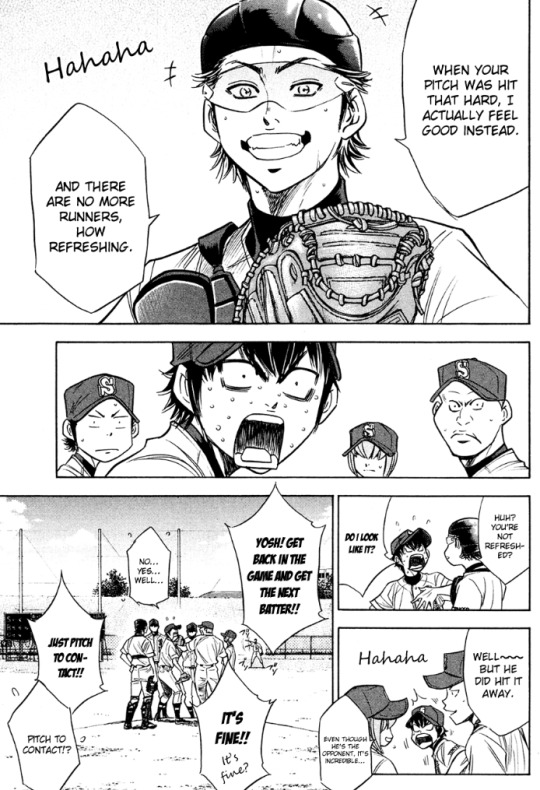
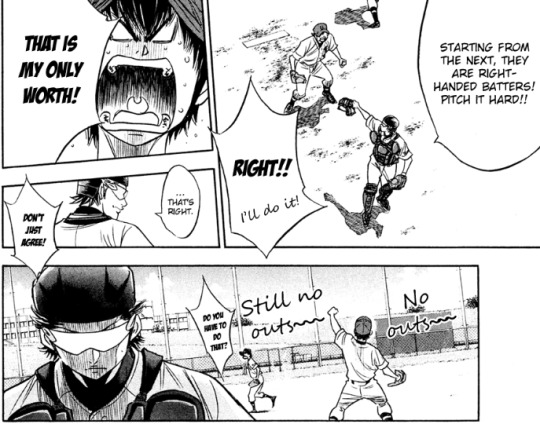
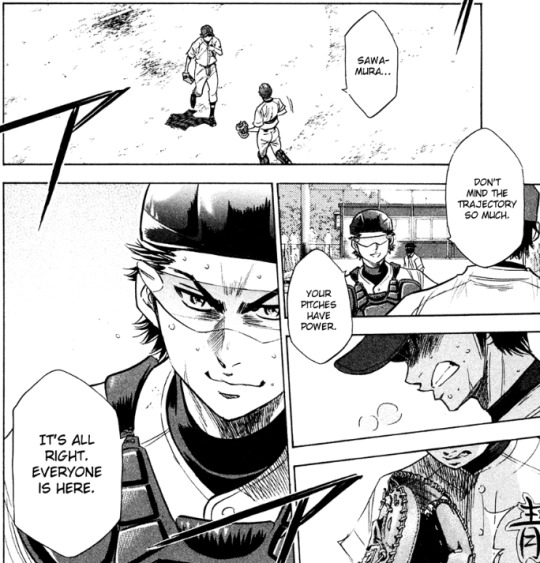
Stage 2 - I've got the yips, but don't pity me
You realize that the muscle memory is "gone". Something you used to be able to do without thinking about it now forces your brain to focus on every step. You struggle with failure, fear of not getting it back, and the sympathy of others.
When you're a highly competitive person in a competitive environment, being told that your sub-par performance is okay is an awful feeling. It feels like a person is sugarcoating the obvious truth to spare your feelings. What should be a gentle attempt to cheer you up from friends or teammates can become confirmation that they never believed in you in the first place, especially when you usually have a relationship based around friendly trash-talk.
In the worst cases, you may feel like they expected you to fail when you thought you could succeed. They pity you as the 'poor, broken player'. And the last thing you want to do when someone treats you inappropriately softly is validate that you need to be coddled.
This piggybacks off of the previous stage and can serve as a mental block throughout the entire treatment process. What stood out to me in the story was how we mostly saw yips through the other characters. Sawamura didn't really ask for help. In fact, he was unusually agreeable to everyone because he desperately wanted to prove that he could live up to their expectations without those expectations being lowered.
You may recall this is the same player who said, "their kindness hurts". Sawamura thrives in the high-drive teenage sports environment where friends talk shit to each other because they believe in one another. When that stops, it hurts.
Sawamura doesn't want sympathy. He doesn't want understanding or pity because he knows the way he played was indefensible. All he wants is to perform again.
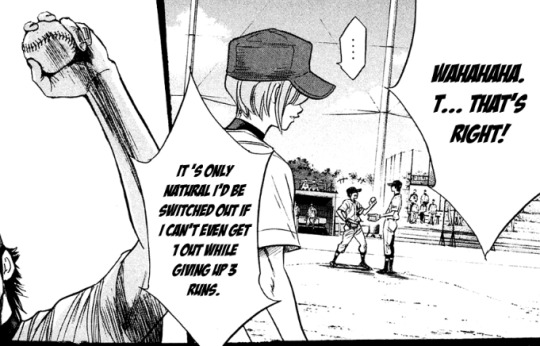
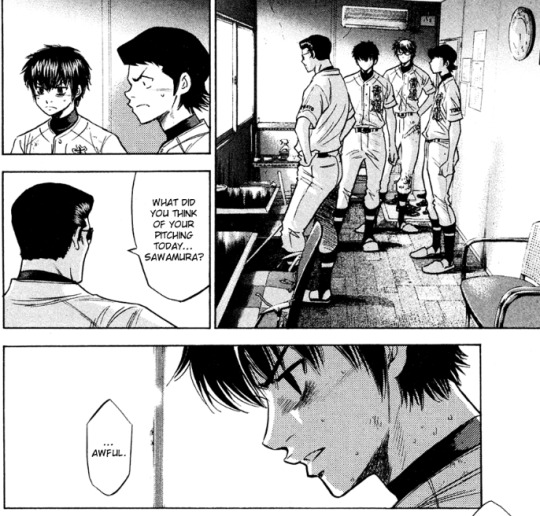
Stage 3 - Step away
Take a break from the affected activity to reset the brain.
This is to avoid cementing unwanted mental patterns. As they say, practice makes permanent. The break may be self-imposed or made mandatory by an authority figure. If you're part of an active team, it can include a demotion or temporary removal. That status change is demoralizing but necessary after the nature of your condition is clear, not only for the success of the team but for you to have less pressure on you while you change tracks.
This is also typically when your mentors start developing a plan to help you recover, or when they adopt a 'wait and see' approach before intervening further.
Unfortunately, there doesn't seem to be a sports psychologist at Seido. It isn't surprising, but it does mean we don't see that as a potential aid here. Instead, the treatment comes in a way many might consider 'old-fashioned' but is a reality for most people.
Taking an approach such as saying, "go run," without a full explanation of why the break might help or what the long-term treatment plan might be isn't something I'd personally recommend. However, it fits with what we've seen in the strictly hierarchical world of HS baseball at Seido. The coach very rarely or never explains himself to his players, and as readers, we often only find out what he's trying to do through analytical characters like Miyuki, who piece it together themselves.
This is also common, if not desirable according to some cultures, in competitive environments. The coach is in charge - you trust their judgment and assume there is a plan, whether or not you understand it.
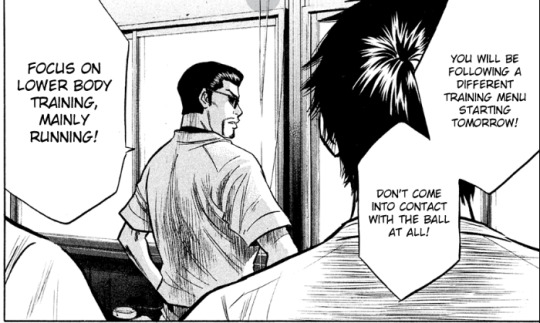

This phase is also where we see Sawamura's other established teachers deciding what to do. Chris tells Kanemaru to wait and see, and that he thinks Sawamura will recover on his own.
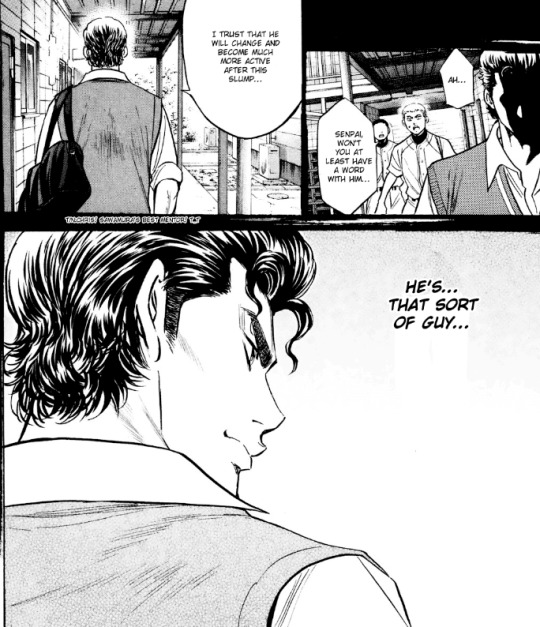
Miyuki, on the other hand, waffles between not being able to spend time on Sawamura due to his own personal challenges as captain and responsibilities to his struggling team, and wanting to make sure Sawamura overcomes the yips. It's unclear if his motivation is due to guilt, friendship, practicality, or some combination of the three, but in the end, he decides he has to take a proactive approach.
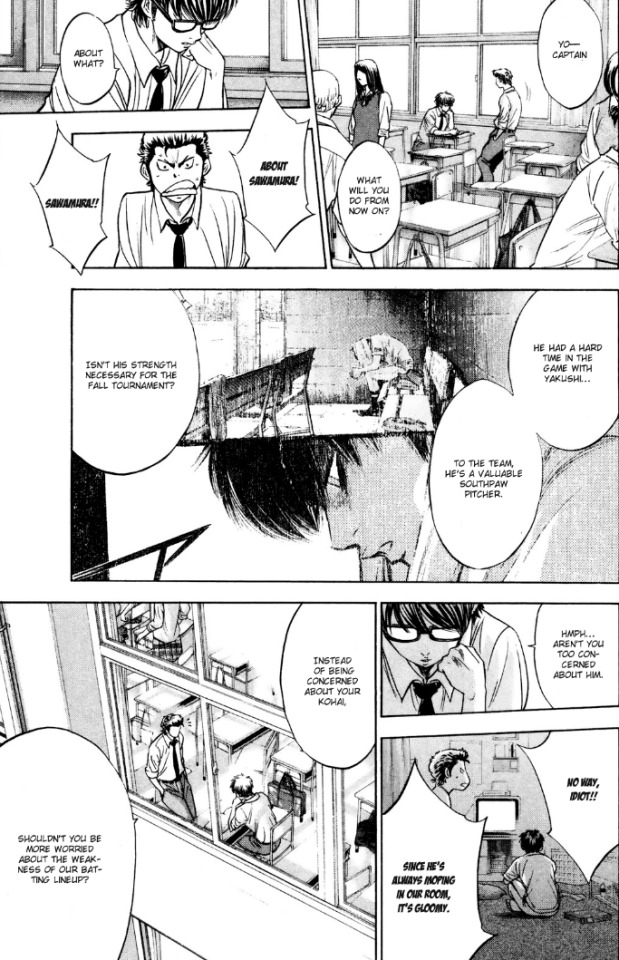

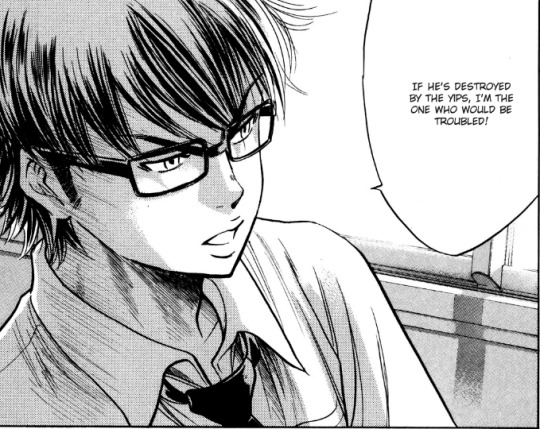
Stage 4 - Everything and the kitchen sink
If the condition persists, try new approaches to replace the lost technique.
This might include learning a new skill so you don't have to do what the yips are affecting, moving to a totally different environment or league, trying a new position, or pursuing any number of therapies. Typically, the old technique is not being used at this point except to test progress. Sometimes this phase will allow a player to ignore their condition by cutting out the problem behavior entirely, thus letting them return to their previous position without recovering from the yips.
There are two main examples of this I can think of that we see during the yips arc. The most controversial is the advice by Ochiai to completely change Sawamura's delivery so he can remain useful to the team. Although this was quickly overturned because of the reason Ochiai suggested it - not actually to help Sawamura's recovery because he was already pitching again at that point but to make him 'useful' - a pitcher changing his delivery to overcome the yips is surprisingly not without historical precedent as an idea. Daniel Bard tried a huge number of things, including temporarily becoming a sidearm pitcher, to recover from the yips.
Ultimately, Miyuki, Chris, and Katoaka settle on the skill replacement idea by teaching him the out-low. It's unclear if the original idea came from Miyuki or Katoaka, though the implication is this was Miyuki's plan, and Chris agreed with it when approached, reversing his previous stance that Sawamura could recover on his own.
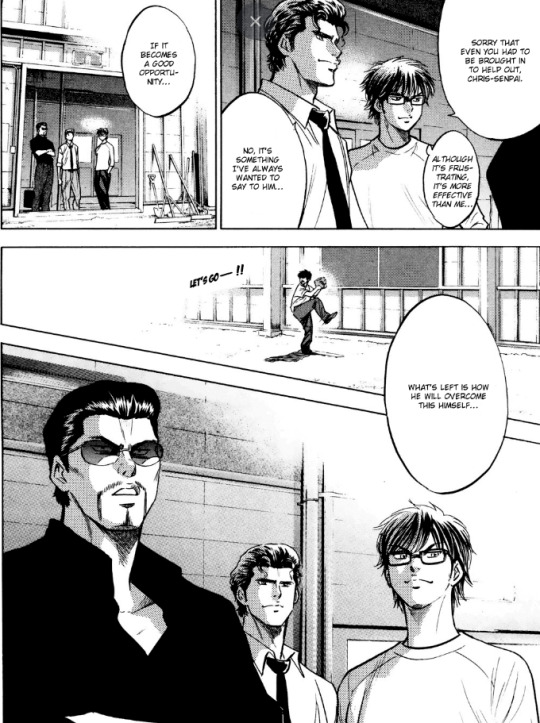
Regardless, all three seem hopeful that this new set of pitches can get Sawamura back in the lineup and help him recover mentally.
Even with that hope in mind, they know he may or may not ever be able to pitch inside again. That isn't the point of teaching the out-low, though it would (and does) make him more dangerous if he can regain his original pitches. The point is to catalyze a return of Sawamura's confidence for his own sake and that of the team.
It also serves as a foundation for an important mental skill. Relaxing. As goofy as it looks, it works well for Sawamura and makes an enormous difference in his pitching.
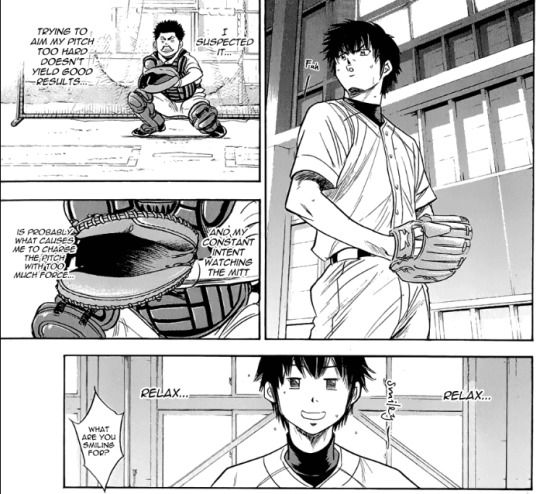
Stage 5 (hopefully) - Oh hey, it's back!
With a lot of repetition, experimentation, and a healthy dose of luck, you spontaneously regain what you lost.
If you're one of the lucky ones, your mental block may disappear as suddenly and quickly as it appeared. Something 'clicks' and you're able to perform as you used to. The recovery isn't always permanent, unfortunately, and even if it is, you'll need to practice on your good days to make the consistency stick after so long away.
Ultimately, Sawamura is able to recover after persevering through several games. It was both a joy to see and unsurprising, considering the nature of the story. In Sawamura's case, he ends up stronger for having gone through the yips. Not only mentally, after having his often naively optimistic nature challenged, but physically with a wider pitching repertoire.

One thing I want to make clear before I finish
Although dealing with the yips does require incredible mental strength due to its frustrating and demoralizing nature, recovering or not recovering doesn't prove your superior or inferior character as a person. No person, technique, attitude, or therapy has been shown to reliably reverse the yips once they've occurred. All you can do is work hard, experiment, and hope it pays off. Thankfully for Sawamura, it did, and it allowed us to see him mature significantly as a person and a pitcher.
16 notes
·
View notes
Text
I don’t want to say fictional robots “belong” to autistic people because any given fantastical allegory can have manifold and meaningful resonance to all manner of diversities, but something I do think is very interesting about fictional robots as an autistic person is this:
Robots as a plot element or character arc often center on this question of emotions. Do you feel emotions? Now, this is an imperfect argument about humanity/authenticity in the first place since there are plenty of Real Human Beings who experience anhedonia or alexithymia- but I think also, in my experience, a lot of these stories- sometimes in-universe, sometimes only in fandom responses- betray that maybe a lot more people than they think, are not very good at identifying emotions.
Many fictional robots- to be blunt- pour with emotion. They will often have a blunted affect (that is to say, speaking in a monotone, or limited facial expressions), they may use overly technical terminology, but they will make arbitrary decisions based on personal preference, it will be nakedly obvious they have a preference and their preference is determined at least in part by what pleases them. Data from Star Trek adores his cat and cares deeply about art and poetry.
And I won’t say any of these characters are bad people. I don’t want to suggest the goal is to create a character who’s “really” emotionless. If there is a quibble I have with this, it’s that I think we could all afford to be a little more careful and a little bit more imaginative, when considering how other people’s minds work, and how they present details. Not just as a joyless finger-wag of “you should be more responsible!” (though I will say there is some joylessness to it- I don’t really enjoy being shown a character who emotes close to how I naturally do, being fretted over by people asking if that character has a soul, is a real person, or simply an effective mimic; that hurts a little too personally to be fun!)
I was thinking of this because I was reflecting on one of my favorite little videos, My Job Is To Open And Close Doors. It’s a simple little uninterrupted 3-minute monologue about an AI who, well, see title, but has a bit of a crisis of purpose and asks themselves a bunch of critical questions about their role and purpose.
At its core, to me, the AI in My Job clearly experiences an emotion; they see something in the course of doing their job that they have no protocol or instruction to halt before, but feel an incredible misgiving about following through on. In response to this misgiving, in a very human manner, they begin to procrastinate- all the while, they point out to their own mounting confusion that this is a meaningless activity, but it buys them more time.
The voice acting given to the AI is very good, and, to me, cinches the whole piece- the actor very specifically does not leave a neutral-pleasant tonal range, and at several points, rather than asking an obviously “emotional” question, the AI simply hangs up in their own thinking talking to themselves- “because- because- because-” a very mechanical sort of stutter.
And using this flat affect and mechanical quirks, the actor establishes and fits to an emotional vernacular. The thrust of the plot- that the AI isn’t sure why they’re hesitating when their job is straightforwards and clear, that they even take note that this is being recorded as an error by another party- repeats in the sense of the stuttering- just as they procrastinate opening the doors without being sure why, they too “procrastinate” the completion of their statements when they’re unsure of them. The AI believes that the delivery of a solution, an answer, a “point”, is inevitable, so when they do not feel they have an answer they are incapable of saying “I don’t know”; instead, they stall. They procrastinate in the hope of achieving enough time to deliver an answer that meets their standards, that satisfies the parameters either set by their programming, or their own feelings.
My Job also adds in a sense of why emotions are important- in a sense that is not about enjoyment or satisfaction, although the AI ultimately does feel tremendously satisfied at the successful conclusion of their quandary- because without the ability to experience “baseless misgivings”, they would have simply responded to the initial command to open the door and been unbothered by whatever happened. In that sense, you could argue, it’s an ‘emotion’ born from ‘logic’ (that there is something amiss, though it takes the AI time to tease this out of their own thinking) but at that point we’re barking up a fool’s tree of semantics because our “logic” and our sentiments are both chemicals clattering around the same undifferentiated apparatus at the same time and thus inextricably attached to one another.
The thing that kills me about this is- with no hostility to the commenter in question- I scrolled down into the comments of My Job and immediately saw someone talking about how clearly, the AI has no emotions.
To me, this entire plot is about an AI having an emotion. Unmistakable and clear. This is about a door mechanism experiencing a profoundly human response to distress- procrastinating on the completion on a task they have every resource and in fact an active imperative to complete, based on a misgiving they are unable to articulate. This revelation is so profound to them that at the end of the video, they actually reframe their entire objective- “My job is to protect the human. My job is a great purpose.”
So I guess if there’s a tl;dr or conclusion to this sentiment, it’s that I think that while we can and should absolutely tell stories about fictional robots- because they are cool, and because they are also tremendously useful to ask certain existential questions about personhood- I think that it is actually very important to temper both our creation and consumption on these narratives on a more robust theory of neurodivergence, and, “I don’t recognize the way this emotion plays out in this particular person” does not equal “there is no emotion there at all”
#writing ruminations#readmore#obviously someone who experiences anhedonia/alexithymia or similar conditions can absolutely have their own take on this and I apologize#if I have accidentally come off as like... 'emotion is what makes you human'#I think that we're complicated stress-reactive chemical computers#and I am sort of broadly defining emotion in this case as 'any sort of subjective non-data-based psychological response'
206 notes
·
View notes
Text
Nightwing 79 Review
i said i would and i will. i did like this issue! not as striking and attention grabbing as 78, but i think this issue was meant to be a foundation one, laying out the groundwork for the future. overall, pretty good. also there wasn't enough bitewing. as promised, overly extensive metaphors and me reading too much into things under the cut
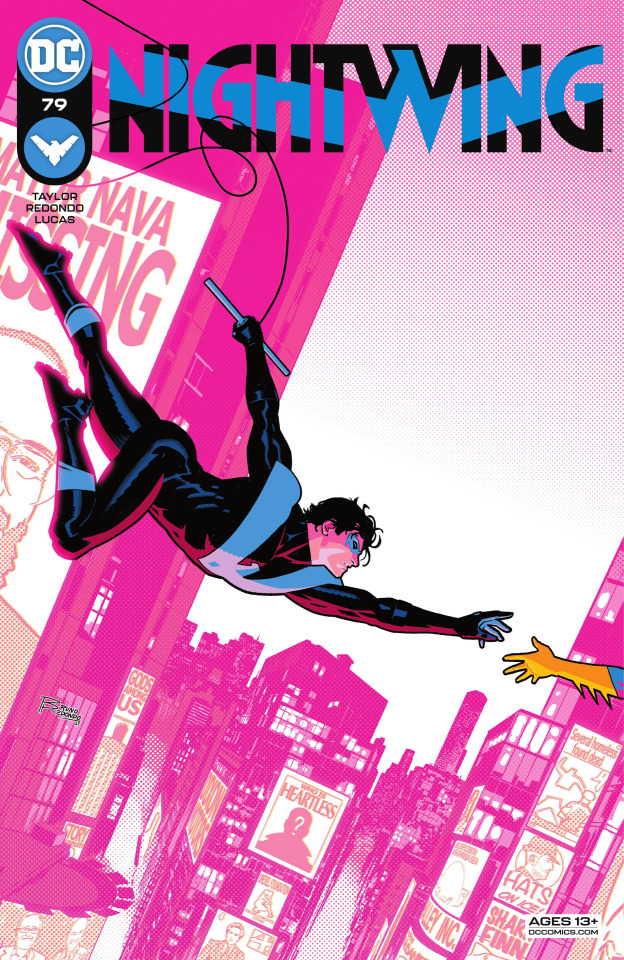
i know i've talked about this cover before, but this particular thing is oddly important to me, so i'll talk about it again
this is me, once again screaming about how artists put nightwing in traditionally feminine poses and how every time i see it i just get whiplash. i mean, true, the main reason why is because nightwing is a so often sexualized character, and putting him in these poses just increases the objectification, which is a goal that dc producers have. but there are very few popular male characters that do this. the only one i can think of off the top of my head is deadpool, but that was so obviously a critique and a way to make fun of the media industry. when they draw dick like this, they’re being serious. they’re putting him in appealing poses meant to show him off, and that’s something that’s traditionally only been done to women.
it's a very direct and very loud breaking of traditional gender roles in media, especially for a character as high-profile and historic as dick grayson. colour also plays a factor in this. the entire background is pink. i was absolutely shocked when i first saw it, when the teaser came out, because i cannot think of any comic book covers of male comic heroes this high-profile where pink is even just prevalent in the cover, let alone the majority of the cover. the pink does look beautiful: it offsets and highlights the black and blue of dick's suit gorgeously, but does it with more finesse than orange or red. but the fact that the stylistic choice was made to accent and draw this cover with aesthetic and beauty in mind, completely ignoring traditional hard-set gender rules in art, was a conscious choice and one i wholeheartedly support.
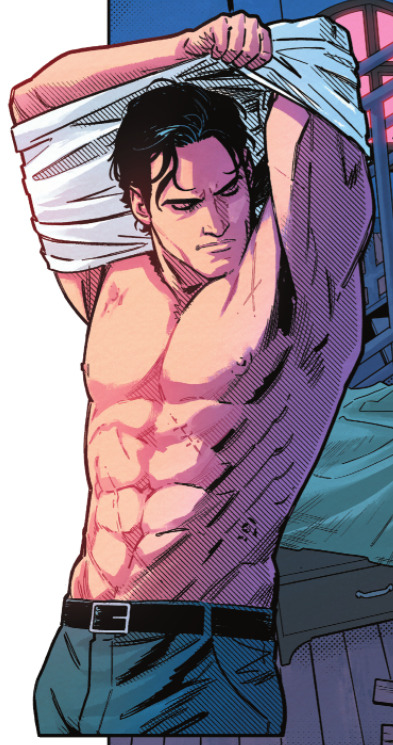
just another example of the sexualization i was talking about. i remember seeing harley quinn in this exact pose in suicide squad.
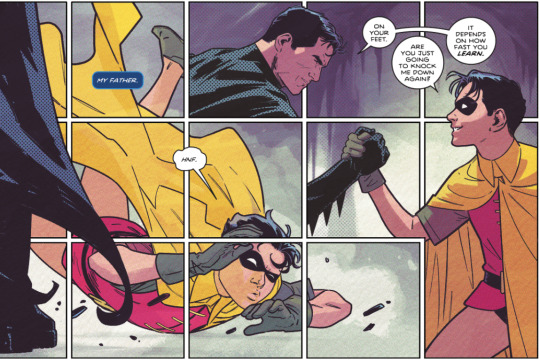
so far, taylor's been pretty dead-set on bringing alfred to the forefront of importance in this series. he wants people to know how much he loves alfred's character, and how much the butler meant to dick growing up. he was dick's father too. but what i adore is how taylor managed to stress alfred's importance in a way that didn't insult or belittle bruce.
this is one of the best bruce and dick interactions i've seen, and it's done in one simple interaction. in this, bruce is tough and harsh. he knocked dick down hard, but then he reached a hand down and helped pull dick back up. let me analyze their dialogue for a minute
on your feet: this is bruce telling dick to get up. he's trained dick, he knows what the younger boy is capable of, he knows his limits, and he knows what dick can do. this is bruce telling dick i know you're strong enough to get up, so get up and prove me right
are you just going to knock me down again?: surface-level, it looks like dick's complaining. he doesn't like bruce's rough training, and he's tired of bruce knocking him down. but look at his face in this. he's smiling up at bruce, knowledgeable and a little hopeful. he knows that bruce is doing this to help dick better himself, he's completely on board with the rough training, because they both know the rewards are incredible. also, he's teasing. he's bantering with bruce. there's an ease in that joking statement, one that belies affection and intimacy. they've only known each other for a little bit, but they're already slipping into a close familial relationship.
it depends on how fast you learn: this is bruce bantering back. this is bruce not being a stoic, unfeeling asshole. instead, he's shown with the dry humor that a good batman writer knows is a staple of the character. he's teasing dick, telling him he'll basically whoop his ass if dick doesn't learn fast enough. it's incentive for dick to train harder, while also being lighthearted enough to tell dick that believes in dick and doesn't want him to push himself too hard.
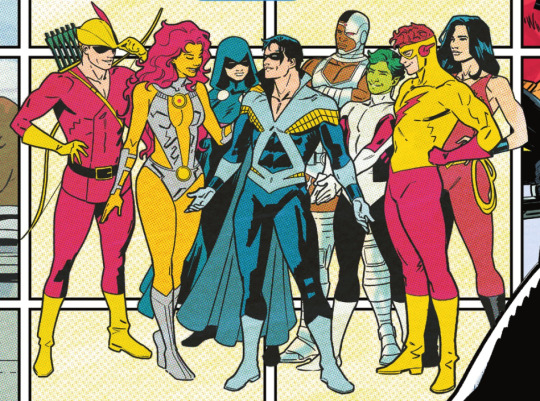
gosh i love the titans. also it looks like wally's staring at dick's ass.
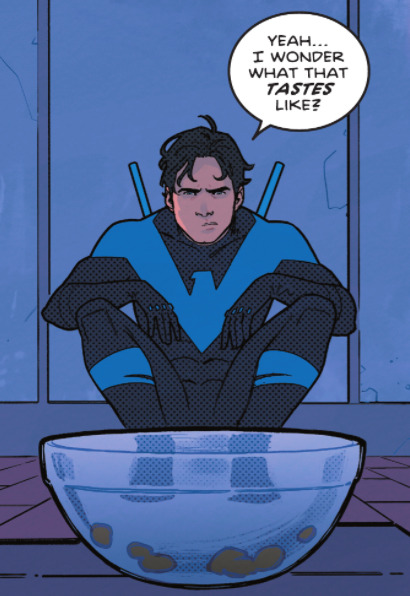
this was cute. a prod at dick's silly and playful sense of humor, while not dumbing him down for the sake of a laugh. instead, he's joking about food, which is stuff everyone jokes about. this is the kind of stuff that'll actually make me laugh, instead of just making me vaguely uncomfortable.
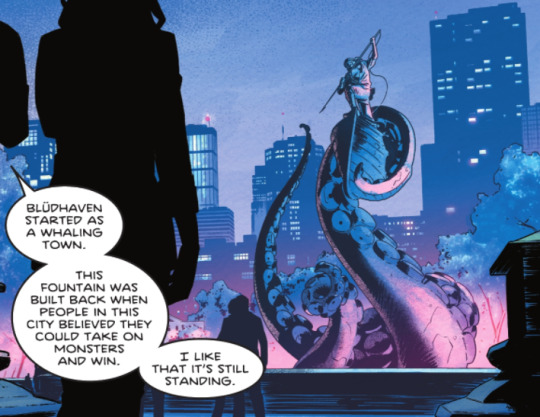
bludhaven's almost always portrayed as a cesspool of a city. and to be honest, it really is. but this panel gives the city a meaningful history, while also giving us a reason for why dick moved there.
it talks of a time when people still thought they could beat the monsters. that if they fought hard enough, they could win the fight. it was a tentative hope that you could always overcome hardship.
dick's little "i like that it's still standing" shows how he still believes that, despite what the rest of the world thinks. despite everything that he's been through, dick is still tentatively an optimist, and believes he can fight the monsters of the world and win. it's a beautiful testament to his character, and i'm like that they added his signature element of hope back in. it used to be what he symbolized as robin, and despite his growth and character arc from robin to nightwing, this is one aspect of robin that i'm glad nightwing still has.
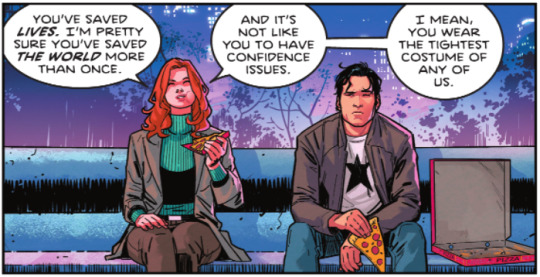
remember when i said "things that make me vaguely uncomfortable??" yeahhhh,,,,,,,,,,,,,,
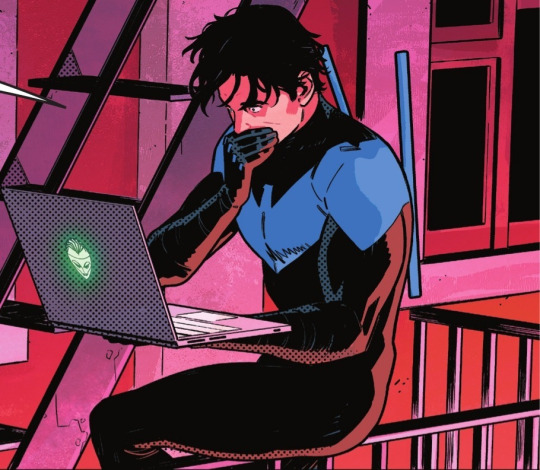
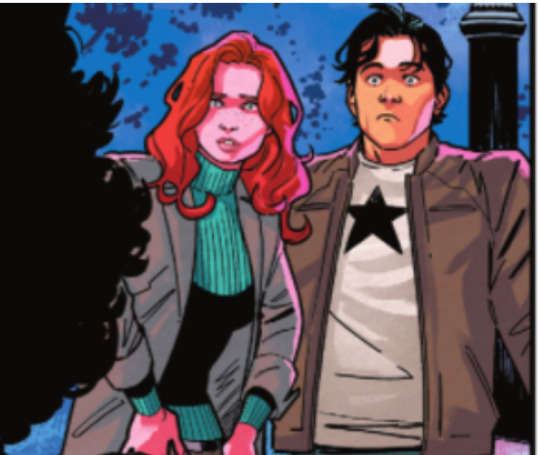
Shooketh Dick: A Sequel
(the expressions in this series are just,,,,on point)

this was an incredibly sweet and kindhearted thing for dick to do, but i found it kind of,,,,,,,,desperate? maybe that's just me, but let me explain.
dick's suddenly a billionaire, and he has entirely too much money that he knows what to do with. it's also alfred's money, what the man left to him, so dick forever links it with alfred. in addition to that, he's back and bludhaven and looking at it with "fresh" eyes. (at least, from a different point of view since he got shot in the head. then mind controlled.) he's desperate to do something with the money and he's desperate to help the people around him that so obviously needs up, so he comes up with an on-the-fly solution that's a little impractical and a little crazy, but it still helps and still does some good.
to me, dick seems a little lost. he hasn't completely found his balance yet, and he's trying to do things that will. he tries charity, because that's what bruce did and it's what he knows, even though he admitted that he always thought bruce could have done more as bruce wayne than batman.
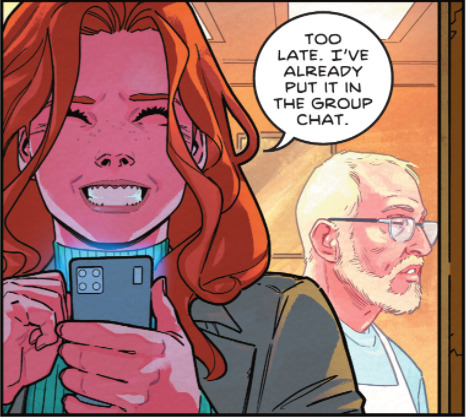
they have a family group chat guys yall were right.
also, do i think that dick would ever actually get his wallet stolen?? no way in hell, he’d notice someone getting ready to pickpocket him a mile away. but i suppose it’s important to the Plot.
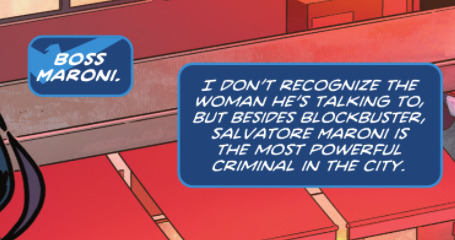
okay this is getting interesting. first blockbuster, now maroni (+ the weird heart stealer guy). i can officially say that i am intruiged
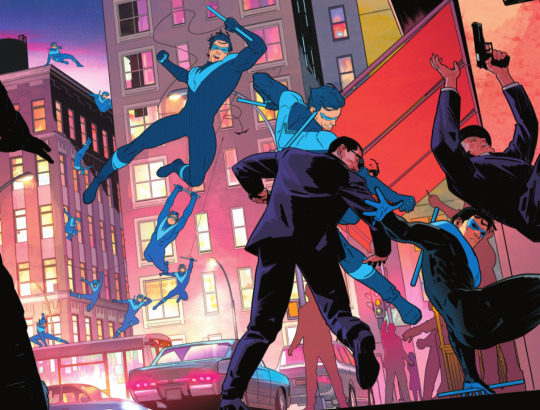
this particular artistic quirk is shown a lot in this issue, and from this art team in general, but i feel like this panel is one of the best examples of it. it was stunning enough to take up a full page, and it’s well deserved.
the way they show dick moving is absolutely brilliant. as a reader, i like seeing these smaller versions of dick getting clearer and in more detail as they come closer to the screen. not only do they show depth in the picture beyond what a simple 3 dimensional piece of art does, it also shows the passage of time.
in addition, it showcases dick’s skill. dick spots these mobsters running after a group of petty thieves. he then, and follow me here, leaps off the roof of one building feet first, springboards backwards off the side of the adjacent building with his feet, gracefully continues his backflip, rights himself, shoots a line with perfect timing: just in time to soften his landing but not slow him down, execute said landing on top of a moving bus, keep running on the moving bus without missing a beat, shoot his grapple, use the grapple to swing, use the swing to build up momentum, then use the momentum to deliver a powerful blow to the mobsters. and he did all that fast enough to catch up with the mobsters, even though he was a ROOFTOP OVER.
d a m n s o n
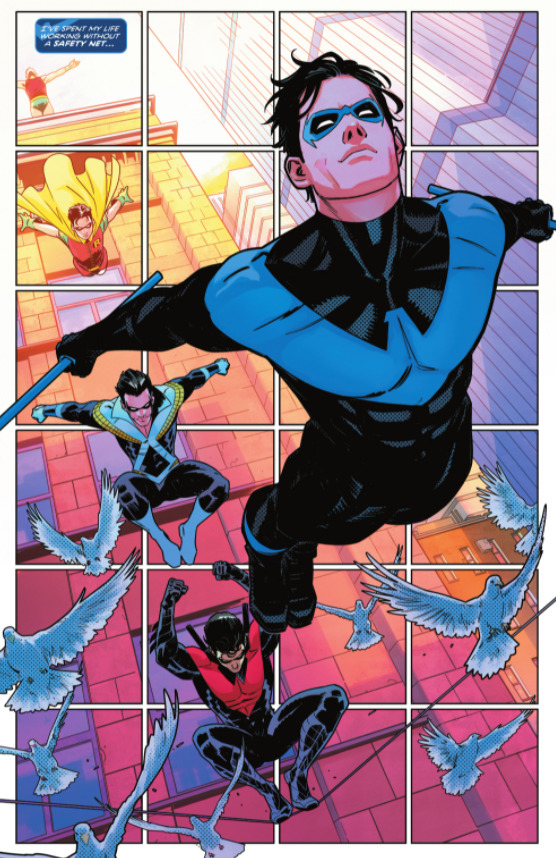
this panel, the very first in the issue, is also another example of that art style, but a little more distinctive. i love the way they showed dick’s different costumes through the ages, along with him simply growing up. it’s a little heartbreaking, but a lot uplifting to see how far he’s come. thank god he got rid of the red. now all we need is the fingerstripes, and we’ll be golden
discowing my beloved. also i can’t clearly see discowing’s hair but it definitely looks like it’s pulled back. it looks like he put it in a ponytail. guys. guys. dick had a ponytail omg.

he’s having a Hero Moment
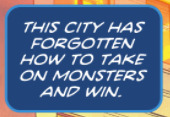
are you talking about the city, dick, or are you talking about you? the kgbeast, the court, the joker. dick fell to each one of them, no matter how hard he fought. he won in the end, eventually and with his family’s help. but i think he’s feeling a little low, a little defeated right now. it’s almost like he needs a win, he needs to feel victorious, he needs to feel like he helped someone (hence the food and the hotel room), just because he needs to remember what it feels like.
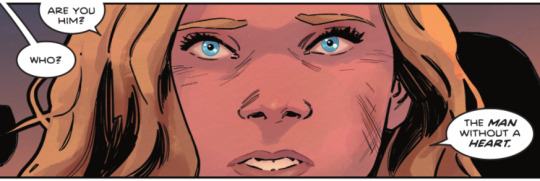
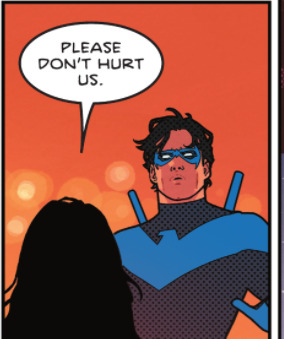
these lines were supposed to resonate with you, and goddamn they did.
i looked at it from two ways. first, it’s the girl asking, begging nightwing not to hurt them. bludhaven doesn’t know dick the way gotham does, they’re still a little frightened of him. this child was brave enough to step in front of all of the other hurt and homeless kids and ask, to a strange man in a mask, if he was going to hurt them like the other men had. it’s heartbreaking, but commendable, and an echo of the city itself that dick’s decided to protect. they’re bloody and broken and terrified, but still gritty and brave enough to stare what they fear in the eye and ask it not to hurt them.
second, it’s dick seeing the question reflected in himself. recently, he got shot in the head and lost all his memories. while i think that the way ric reacted was a perfectly valid and human response to the situation, i think dick still regrets how callously and rudely he treated his family. then, he was manipulated by the court of owls, then he was brainwashed with a magic crystal by the joker. dick does have a guilt complex. it’s not a big as bruce’s, but it’s there. and right now, with this girl begging her not to hurt them, dick is probably thinking about all the times he hurt people, in control of his own actions or not, bc he “didn’t have a heart.”
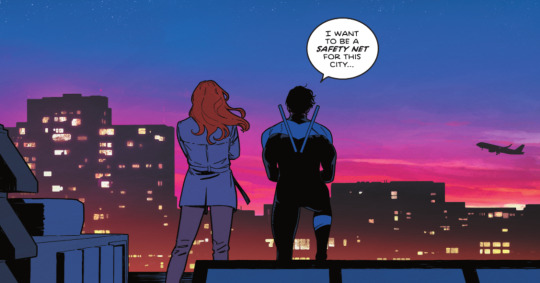
little ambitious don’t you think, dick?
also just look at the sunset colours loOK at the they could not make this any more obvious oh my godddddddddddddddddddddddd
in conclusion, i need more of her
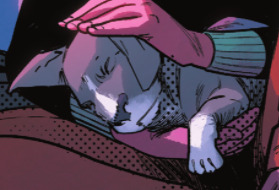
#dick grayson#nightwing#nightwing 79#nightwing 79 spoilers#dc#dick grayson meta#nightwing meta#nightwing 79 meta#dc meta#river thinks too hard
125 notes
·
View notes
Text
just because you’re afraid it doesn’t mean you’re broken.
Titans 3.05
once more into the cold dark void of the internet with my stream-of-consciousness take on a superhero tv show...
spoilers ahead.
1. i cannot believe that among the first things i get to hear in this episode with my own two ears is the line 'eluded our overdudes'. why must you give me such pain along with so much joy, show?
1.5. scarecrow stringing jason along on this path to red-hood-dom is not something i would’ve ever expected, but does kind of make sense.
1.55. i don’t know all the details of the original resurrection arc in the comics but i like that jason, weirdly, has a greater role to play in his own demise and rebirth? i think it makes it easier to draw a line between his past trauma, the demonstrably shitty and terrifying responsibility of being robin, the ways bruce and the titans wronged him, his responses to that, the reasons he turns to scarecrow, and his final evolution to red hood. it makes for a smoother character arc rather than a one that was interrupted for two decades before somebody went oh hey let’s resurrect that kid that the audience once voted to kill and make him an anti-hero!
1.75. what’s crane giving him? anti fear toxin? anyway, crane is a fucking creep and i’m not sure i want to see a whole lot of him on my screen.
2. oh, um, heads up: there’s a long sequence of unsteady cam + flickering lights right after the title card upto the 3:16 mark. it’s a bit headache-inducing so if you want to skip, you can go ahead and do that.
2.45. that’s... weird... why would he dream about... donna...
ok, who am i kidding. i’m going to jump right into my theory about Why Titans Makes Sense Actually because the show itself is apparently not interested in explaining itself:
a) it makes no sense for jason to be conjuring up donna--who famously did not care much for him!--in his dreams. (he wasn’t even there when she died.) or for her to be telling him don’t go or there’s still time.
b) this leads me to think that that’s actually donna, in some sort of limbo between life and death, the kind of place where jericho used to be
c) rachel has demonstrated that she has the power to link the minds of the titans across great distances--she called jason and hank/dawn for help in 2.01, she linked up everybody later in the season, projected dick’s hallucination of his father into their brains without even realising she was doing it, and in the finale, she managed to get dick into conner’s brain. she’s in themyscira now. is this how she gets donna back to life? but reaching out to her in that non-space between life and death?
d) the next obvious question is: why isn’t donna appearing in the dreams of the other titans? she probably is, but they have better reason to be dreaming about her since they were actually close to her, unlike jason.
e) but why would she warn jason in particular? does she foresee jason entering the afterlife--however briefly? does she have an idea of what jason plans to do and what he will become?
f) anyway, more trippy mindscapes and weird psychic powers, yay!
2.5. my heart clenched when bruce comforted jason post-nightmare: clearly i’ve been reading way too much batfam fic. this is a side of bruce we haven’t really been told to expect by all the characters on the show calling him a ‘psychopath’ (*cough*unreliablenarrators*cough*) and him getting jason to speak to a professional speaks volumes about the kind of self-reflection he’s done post dick’s departure, and maybe some of the regrets he has with regards to how he dealt with dick’s traumas.
i mean, just look at him when jason dismisses his concerns! BRUCE IS TRYING JASON

anyway, i have a whole lot more i want to say about this, but i’ll save it for later.
also: LESLIE THOMPKINS!!!!
3. i really like molly--and i love that she’s a friend from before jason got taken in by bruce, the implication that they meet up regularly and that she’s a grounding influence on him (tho clearly not grounding enough to not go along with his dumbass idea about confronting a child trafficker alone).
3.5. aw, jason. robin was his armour against everything in the world that would throw him down and chew him to bits, but san francisco proved that even robin wasn’t enough to protect him. it’s really interesting how ‘disillusionment with the idea of robin’ is so integral to the traumas of both dick and jason but in such different ways.
4. LESLIE!!!!!!! i even forgive her office being so goddamn blue because leslie!
4.5. it makes so much sense for titans!verse leslie to be a therapist, because this show is so inward looking anyway, and therapist sessions are a useful tool to showcase this character work in a story. besides, at least in fanfic, leslie often seems to double up as a counsellor anyway.
4.6. oh man. i’m not terribly convinced by walters’ red hood (tho i think that may be the point--argh. i’ll come back to this thought later. have to stop getting distracted!) but he plays the asshole kid that’s trying not to let any real emotion seep through really well.

“you’d like me to punch you, wouldn’t you”
5. not sure what to think of batman’s little trophy case other than the show winking unsubtly at us and going look look - catwoman! the riddler! two face! you excited yet?! it’s like the scene from the end of amazing spiderman 2 when they were trying to drum up excitement for a sinister six spinoff by having harry osborne walk by a bunch of display cases with stuff from iconic villains in them.
... but then again, bruce does like to display a lot of shit in his batcave, including his dead robin’s bloodstained costume, so.
5.5. bruce is so soft with jason it’s killing me. beyond just trying to learn from his mistakes with dick, it speaks to his own genuine desire to balance his dedication to gotham with doing the best by his sons, although he’s often not successful with that.
i love that titans is really playing the long game with bruce wayne, with each season and character-perspective sliding in fresh pieces of a bigger puzzle. titans’ bruce has always been a phantom of other peoples’ making, but now we’re getting the idea that he’s a whole lot more complicated than other people make it seem.
5.75. it really recontextualises some of his actions from previous seasons: the fact that he locked dick out of his security systems in 1.06 is likely his way of respecting dick’s independence and his desire not to be associated with batman/gotham anymore. jason knowing about bruce’s tracker while dick doesn’t is probably bruce trying to be more honest and upfront with his charges. bruce sending jason packing off to sanfran to spend time with the titans is probably not him passing on a big responsibility to dick (as i first uncharitably thought) but him trying to get jason out of the toxic influence of gotham for a while and a sign of his trust in dick as a leader and a mentor,
5.8. i mean, bruce is a prick, but he’s also human.
6. i think leslie is doing some good work with jason here, though she may have overstepped the line with her line about robin as a construct being projected by a man with BPD. her speculations about bruce’s diagnosis have no place in her session with jason, and if bruce confides in her, an egregious violation of patient-therapist confidentiality.
(about the diagnosis itself... i don’t know. i can’t really confirm or refute this without a whole lot more information, and i’m not sure if the writer of this episode means BPD in the same way an actual professional might.)
6.5. i think a huge thing that gets missed out in a lot of recent comics as well as movies/shows is that bruce didn’t create the robin persona out of whole cloth. dick did. he’s the starting point of that legacy and to call it entirely bruce’s creation is blatant erasure of that. in fact, i’m surprised that dick doesn’t feature more in the conversations they’re having about the pressures of being robin. after all, the guy had been robin--bruce’s partner--for such a long time before jason.
6.8. (and here’s the primal part of me that resonates the deepest with dick grayson--the Eldest Daughter part--that’s sort of resentful: that jason gets the therapy and softness and the learning from mistakes when it took years and years for bruce to reach out in any meaningful way to dick.)
7. oooh that was a great scene!
it’s fun to do these stream-of-consciousness live reactions, because the moment you step down from your soapbox, the episode goes right into tackling what you were just complaining about. bruce means well, he’s learning, but he goes about exactly the wrong way to help jason: taking away robin now can’t be read by jason as anything but a devastating judgment call from bruce. and iain glen really sells the moment that bruce realises this--too late--and his helplessness in trying to get jason to see that it isn’t jason’s fault that he’s trying to do this. he loves jason enough that jason is enough.
7.5. aaaah so jason brings up the elephant in the room at last. dick got everything makes sense from his perspective, where getting to put on a costume and fight crime means approval, means being something stronger and better than you are. dick got to be robin, then nightwing, and a leader of a whole team of other costume-clad heroes.
8. ... how did jason just walk into arkham????? this is ridiculous.
8.3. i mean, clearly jason’s not thinking straight, but betraying batman like this puts his possibilities of being robin again even further away.
8.5. watching that chemistry experiment montage was strangely funny. this guy is looking for an antidote to fear? well, constantly mixing up and inhaling gases concocted by a mad-scientist supervillain is something only the very fearless--reckless to the point of foolishness!--would do. what’s to say crane’s not given you a formula for a drug that will keep you tethered to his every will and whim? hmmmm?
8.7. so he sought out the joker to... test the formula???
9. wow the “loud and clear... boss” hits different after a whole episode of them referring to each other as father and son.
9.3. waitwaitwait HOLD UP. wait a DANG MINUTE. you’re telling me that scarecrow had enough resources that he could not only have folks on the outside steal jason away and dunk him in a lazarus pit (i TOLD you that this show would bring up and dismiss ra’s al ghul in a ten second aside! I TOLD YOU) but also have his own little chemistry lab in the basement, AND have enough resources for jason to build his red hood persona???????? all of this in barely twenty four hours?
well there goes my ‘jason orchestrated his death’ theory. it was nice while it lasted. *cups hands to the sky* fly away, my baby.
9.6. a part of me is gleeful at the rushed nature of such an iconic transformation though, especially when compared to all the character work that went before it. we’re so used to getting the opposite that it’s fucking delightful to have a show that’s more interested in exploring its characters’ minds rather than battle scenes or recreating transformations from the comics. that’s taken such bold and exciting steps to fully convey all the nuances of its most recognisable character, bruce wayne, from casting an older actor to play him to unflinchingly showing just how damaging the vigilante lifestyle has been to him and the people he loves. BRILLIANT
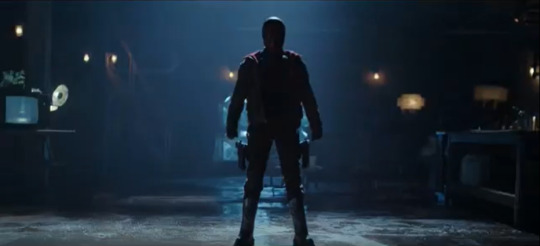
*sporfle*
10. again, heads up: a whole lot of flashing lights between 40:28 and 42:00.
10.3. i guess it’s the super-compressed timeline that’s really throwing me off. where did he have the time to get/develop the mind control thing from? or is it something that he got from the cabal of villains that he intimidated at the beginning of 3.02? very messy.
10.5. i love molly, i hope she shows up again this season.
11. aaaand that’s it! that was a solid episode as flashback episodes go, but now i can’t wait to return to the present.
40 notes
·
View notes
Text
The Maidens: The Cycle of Life and Death
This post is inspired by @hamliet’s alchemy metas... I know nothing about alchemy, but after discussing it with her, this idea came up and I am sharing it on her behalf too.
In short, in alchemical stories (which RWBY apparently is) there are 3/4 phases. Each phase is linked to a specific color:
1) Nigredo (black)
2) Albedo (white)
3) Citrinitas (yellow)
4) Rubedo (red)
That said, often the yellow phase ends up being fused with the red one, so in most alchemical stories there are only three phases. Now, for each phase there is a major death, so there are usually 3/4 key deaths, each one linked to a specific phase.
For example, in Harry Potter there is
a) Sirius BLACK dying
b) ALBUS Dumbledore dying
c) Harry dying and being carried by RUBEUS Hagrid
Let’s highlight that each one of these deaths is especially resonant and important for the story. Sirius dies when Harry discovers about the prophecy. Dumbledore’s death leads to Harry leaving Hogwarts to look for the Horcruxes and finally Harry’s own death leads to Voldemort’s defeat.
What I mean is that the deaths linked to each phase must be resonant and meaningful either in terms of plot or in terms of themes. They must have weight and be felt both by the audience and by the characters.
So far, in RWBY we have had two such deaths:
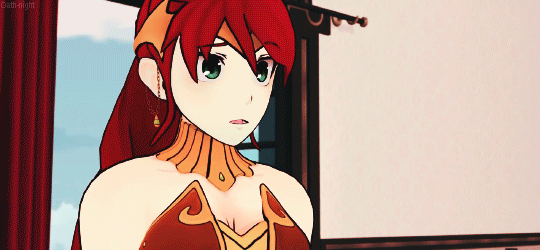

Pyrrha’s death is linked to Nigredo, while Penny’s to Albedo. Interestingly, both deaths happened to two (supposed to be) Maidens.
This is interesting on multiple levels.
First of all, I have been asked about the Maidens in RWBY here and here. However, Penny’s death helped me gain a new perspective of their overall meaning.
In the first meta I have written this:
In a sense, the story keeps repeating. Salem kills Ozpin, he is reborn and his daughters are victims of the conflict between them.
Because of this, the four Maidens have become one of the many symbols of this endless cycle, which is clealry breaking its protagonists more and more.
This is well conveyed by the Maidens having a season theme. Seasons are in fact linked to the repetition of time aka one of Ozpin’s motifs.
I still think it is a part of the truth, but as for now I think the framing of the series over the cycle is more nuanced. It is a cycle of death and rebirth:
Goodwitch: The Maidens have existed for thousands of years. But much like in nature, the seasons change. No two summers are alike. When a Maiden dies, her power leaves her body and seeks out a new host, ensuring that the seasons are never lost, and that no individual can hold on to that power forever.
Seasons live and die, but new ones are born. It is a death that leads to a new life and that protects life itself since the Seasons are supposed to be Guardians.
This fits with the actual cycle of seasons where “no two summers are alike”, but that also accompanies humans’ lives and makes many human activities possible.
Secondly, both Pyrrha and Penny’s deaths have to do with the theme of choice, which is central to the series:
Ozpin: Maidens choose themselves.
In particular, Pyrrha and Penny’s final choices are two different declination of this idea. At the same time, they are linked to the theme explored by their respective relic as well (in Pyrrha’s case it means that her link to choice is twofold).
1) As the (supposed to be) Maiden of Choice, Pyrrha is given a choice in the Vault of Choice:
Ozpin: You, Miss Nikos... have a choice to make.
(...)
Ozpin: Are you ready? I... I need to hear you say it.
Pyrrha: Yes.
Ozpin: Thank you, Miss Nikos.
She is given some time to think about it and in the end she chooses to accept her new duty. Still, the power is stolen from her and the choice she was given is negated to her:
Pyrrha: But I can help.
Ozpin: You'll only get in the way.
However, this does not stop her:
Red-Haired Woman: She understood that she had a responsibility... to try. I don't think she would regret her choice, because a Huntress would understand that there really wasn't a choice to make. And a Huntress is what she always wanted to be.
Pyrrha’s death is about doing the right thing even if it comes with a high personal cost. She is able to make the choice to keep fighting against an enemy impossible to defeat an arc before our protagonists are strong enough to make it.
This is why... even if she never receives the powers.. Pyrrha is the true Maiden of Choice of the Vale arc. She does not need the powers because deep down being a Maiden is something deeper than that.
Pyrrha embodies the idea that Maidens choose themselves because she chooses to be a Maiden at Heart and dies true to her choice:
Pyrrha: Do you believe in destiny?
2) As the Maiden of Creation, Penny is created anew in the Vault of Creation:

As I have stated in previous metas Creation as a concept is linked to free will. Creations are free to develop and to change independently from their “creators”. This fits Penny’s transformation, who ultimately gives her back the free will that the virus had stolen:
Penny: I...I must...open the Vault. I, I do not want...Ah!
And in the end she uses her free will to make a specific choice:
Penny: Let me choose this one thing.
I have actually a lot more to say about Penny’s death and final choice, but I will write a longer meta about it, so for now let’s just say it has to do with self-actualization.
Penny embodies the idea that Maidens choose themselves because she chooses who she wants to be and how she wants to live.
What is more, her choice has to do with Creation because she saves Winter’s life and also (symbolically) makes her a whole person as well:
Winter: No, Penny, you were always the real Maiden at heart. I was just a machine. Just... following orders.
Penny: You’re my friend.
Winter: Perhaps, but I’m choosing it now. I’ve made it my own. And I take great pride in it.
Winter: You chose nothing. This was a gift.
At the same time, Penny’s sacrifice also saves the people of Atlas and Mantle who are stranded in Vacuo. If Cinder had stolen the power, they would have all died.
As a final note, we are directly told the themes linked to both Pyrrha and Penny’s death back in volume 5:
Ruby: When Beacon fell, I lost two of my friends: Penny Polendina and Pyrrha Nikos. I didn't know them for very long, but that doesn't change the fact that they were two of the most kind-hearted people I have ever met. But that didn't save them. Pyrrha thought that if there was even the smallest chance of helping someone, then it was a chance worth taking. And because of that, she died fighting a battle she knew she couldn't win. And Penny... was killed... just to make a statement.
Pyrrha died to make the right thing.
Penny died the first time as a result of her being objectified, so the second time she herself chose how to end her life in a way she found meaningful.
In short, Pyrrha and Penny’s deaths can be read as the two deaths linked respectively to Nigredo and Albedo. What is sure is that they are meant to be compared and foiled.
All this leads to a question... will we have other two (or one) major death(s) that will be linked to (the yellow and) red phase(s)? Will they be other Maidens?
As for now, I think it is possible, even if not sure obviously.
First of all, I do not know if we are gonna have a death for Citrinitas since from what I understood usually the yellow phase gets conveyed as a part of the Rubedo one. Moreover, if we have it, it might not be linked to a Maiden. After all, another pattern one could find is that both Pyrrha and Penny died at Beacon and so did Ozpin, so maybe he will be the one to die (once and for all?) in the yellow/red phase. However, as for now, I don’t think so and I am gonna theorize that the yellow and red deaths, if they happen, will have to do with the Maidens and will be other declinations of the themes explored above.
As for now, we know nothing of the Maiden of Destruction, so I am not considering her.
Still, there is another Maiden whose arc was left unsolved and who needs to come back in the story:
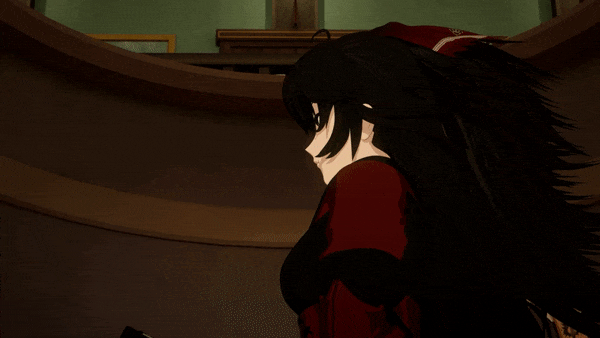
3) As the Maiden of Knowledge, Raven is told the truth about herself in the Vault of Knowledge:
Yang: Oh, shut up!! You don't know the first thing about strength! You turn your back on people, you run away when things get too hard, you put others in harm's way instead of yourself!! You might be powerful, but that doesn't make you strong.
And it is possible that this self-knowledge will eventually lead her to make a choice, which is what she has failed to do up until now.
If she chooses to sacrifice herself, her death will be a redemptive one and it might come to embody that Maidens choose themselves because they can always change and become true Maidens.
Finally, there is the Rubedo phase, which is the last phase. If we are gonna have a red death, it should be a key one for the whole series and one which leads to its resolution. As for now, I think there is only one character who can pull it off:

4) Cinder is a key character for the whole story. Personally, I think this volume was a turning point for her, but she failed to learn the lessons she needed to learn. What she did was to take these lessons and to twist them in a hypocritical way:
Cinder: I suppose I have only you to thank for one last lesson… Sometimes, if you want to win…you simply can’t do it alone.
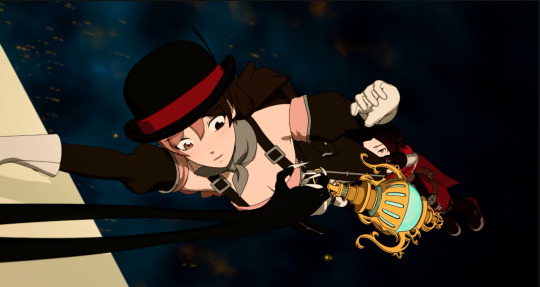
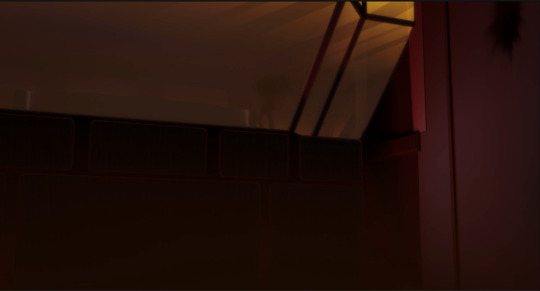
And this has made her even more similar to Salem:
Salem: Why....do...you...keep...coming...back?!
Yang: Why do you?!
Penny: Why did you come back?! Why couldn’t you just learn your lesson?!
I would also like to highlight that so far Cinder has failed to learn the lesson of each relic.
In the Vale Arc, it is implied her concept of Destiny and Choice is different from Pyrrha’s. She wants to be “worthy” and to be chosen. Moreover, her idea of agency is linked to stealing others’, just like she stole the Maiden’s power and Pyrrha’s destiny.
In the Mistral Arc, she receives a warning about her Shadow Hand:
Raven: Aura can't protect your arm, it's Grimm. You turned yourself into a monster just for power.
But she chooses to ignore it.
Finally, in the Atlas Arc she manages to make herself anew. She recreates herself, but fails to truly change.
I am expecting all these failures to come back at her with the Vacuo Arc, which is about Destruction and will probably lead to everything coming together to crush Cinder (the people she used, the Shadow Hand, Salem’s true plan).
Once this happens, I think Ruby will save her with her eyes and will offer her that pity she was never shown as a child. This will lead to Cinder’s final choice which might be a synthesis of all the choices made by the Maidens she killed.
It will be a selfless choice, like Pyrrha’s, in contrast to the selfishness she displayed throughout the series.
It will be a self-actualizing choice, like Penny’s, which will free her from Salem’s shadow and influence
It will also be a redemptive choice, where Cinder finally lives up to her name and becomes the true Fall Maiden.
I am also expecting this choice to somehow solve the conflict or to be a part of the reason why the conflict is solved.
It would also be interesting if the Maidens’ sacrifices become progressively more effective in solving the conflict.
Pyrrha’s death is the most pyrric (obviously). She did not manage to stop Cinder, but barely gained enough time for Ruby to arrive and wound the villain. Still, it is a choice who clearly inspired her friends and I think that in the end it will inspire Cinder as well:
Cinder: You know, Neo, someone once asked me if I believed in destiny. And I'm happy to say I still do.
Penny’s death is framed as a sad, but powerful conclusion to her arc and saved both Winter and the people of Atlas and Mantel. It still did not prevent Salem from taking the relics and did not save the Kingdom.
So, maybe Cinder’s death, if it happens, will be key in saving the world.
This would also fit with the idea that we are going through a journey where we are getting to know the four gifts the Gods gave humanity.
Pyrrha sacrificed herself even before our protagonists received Knowledge, Penny did so after both Knowledge and Creation, while Cinder perhaps will do so after the characters have aquired all the four gifts.
#rwby#rwby spoilers#rwby vol8#rwby meta#rwby theory#pyrrha nikos#penny polendina#raven branwen#cinder fall#my meta
132 notes
·
View notes
Text
Here Lies Jenny: Bebe Neuwirth’s under-remembered masterpiece?
While Bebe Neuwirth is often remembered foremost for her presence in worlds like Chicago, Cheers or Fosse, there’s another piece in the tapestry of her work that brings many notable threads together and is equally significant to her.
Here Lies Jenny is the somewhat under-discussed piece of theatre that in fact has connections to all three of these aforementioned things, because of the people she worked herself on creating it with, and deserves to be brought up with slightly more comparable frequency.
A moment then to explore some of the history of this elusive but important show.
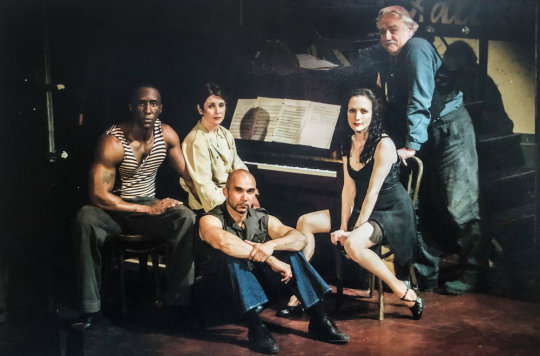
Here Lies Jenny, recalled as a “surprise off Broadway hit”, opened at the Zipper Theatre in downtown Manhattan in May 2004 and ran there for five months.
The show was an interpretive revue of the music of German composer, Kurt Weill, born out of an idea Bebe had herself. It was shaped by collaboration with close friends – with its initial genesis assisted by Leslie Stifelman (the show’s pianist, who she’d worked with on Chicago), direction by Roger Rees (who she’d long known and worked with since their time on Cheers together), and choreography by Ann Reinking (who was Bebe’s closest dance companion in the Fosse universe).
Set in a dark and shadowy looking barroom, the piece followed Bebe as the central, amorphous female figure named ‘Jenny’, supported by three male cast members and a pianist, through an evening of carefully selected Weill songs. Alongside Bebe and Leslie on stage were Gregory Butler and Shawn Emamjomeh, as two rough denizens of the bar, and Ed Dixon as the general proprietor.
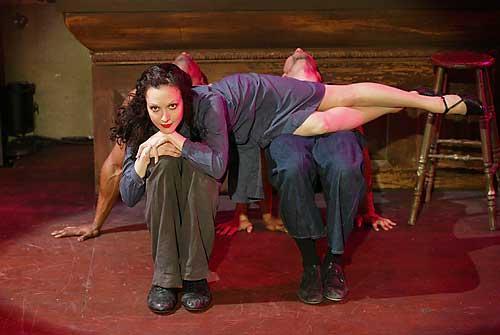
There was no linear storyline to the show and no spoken dialogue, but Bebe described how the evening unfolded “in a very logical and emotional, fulfilling way.” All of the songs presented “[described] the interaction between these five people there, that make it necessary to sing the next song.” Rather than taking a group of songs by a particular composer and imposing a narrative on them, the songs were interwoven together to create an “impressionistic and realistic painting of this person’s life.”
To give a summary of the show’s arc, Jenny initially descends the wire staircase into the bar, with little more than a frightened expression and a small bag of wordly possessions. Accosted by the two forceful patrons, she’s flattened down both physically and emotionally. The men depart and return throughout, and the emotional core of the piece fluctuates from song to song as each number evokes a different picture and interpretation of a circumstance or feeling. As reviewers put it, “she’s sometimes bold, sometimes reticent, until she leaves…with what seems like a modicum of self-possession and hope,” and “climbs that long staircase on her way into the world again.”

The idea for creating Here Lies Jenny came out of Bebe’s own desire to put together a piece of theatre and an evening of performance of her own. It was a notion intensified by growing external interest, or as she recalled, “people have always said to me ‘Do a show, do a show, do a one woman show!’”
But for a while the form the piece would take was unclear. Bebe knew she “didn’t want to do a revue”, and she didn’t want “the usual cabaret thing… [or] ‘Bebe and Her Boys.’”
“I generally hate one women shows,” she would remark, “unless it’s Elaine Stritch or Chita Rivera or, you know, Patti LuPone.”
According to Bebe, she’s “much more comfortable as a character doing something. I'm not comfortable just being myself and singing in front of people.”
On and off for around two and a half years then, Bebe had been considering how to approach this matter while putting together some music, predominantly that of Kurt Weill, with musician, conductor and friend from Chicago, Leslie Stifelman.
Leslie suggested bringing in a director, so Bebe turned to Roger Rees – a person she regards as “not just a great actor,” but also “a fantastic director”, with a “very interesting creative mind.” Showing Roger the songs, he “realised that they all described women, or aspects of women, or different times in women’s lives.”
Roger thought it would be interesting then to combine all of these varied sentiments and have them channelled through one specific woman, in one specific location, to present a complex but diversely applicable tapestry centred around the emotional interiority of one tangible female force.
The show is “fragmented, prismatic…less narrative than poetic,” according to Roger. It’s not prescriptive. Rather, it evokes strong feelings and allows the audience to interpret them into their own individual and personal narrative for this woman. It poses questions and provokes thoughts. Who is this woman? Why is she here? Why is she here now? Is that a child? Or is that just a wish for a child? What did she have in this life before we meet her and what has she now lost?
It is indeed an unusual entity, and atypical from other more standard revues, cabaret acts, or works of theatre. A “self-described Japanophile”, Bebe explained how it played in the “Japanese aesthetic concept known as wabi sabi.” Of this she would elaborate, “There’s no direct translation, but it’s about the beauty of things as they age, embracing what’s painful in life as well as what’s joyful.”
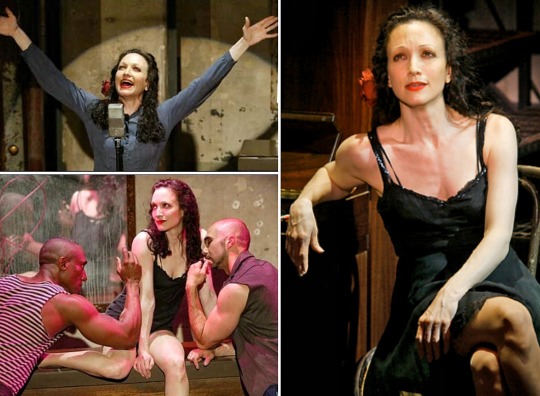
It is certainly a piece that contains beauty as well as pain, which itself is a complexity and dichotomy often ascribed to Kurt Weill’s music.
When initially finding and working on songs for what was to become Here Lies Jenny, Bebe noticed being drawn to the work of one composer most strongly.
Like Bernadette Peters talking about how she gravitates to selecting Stephen Sondheim’s material for her concerts, Bebe would say simply, “all of the music that I loved the most was Kurt Weill music.”
A revue in 1991 called Cabaret Verboten (also with Roger Rees), that sought to recreate a Weimar Republic cabaret and re-conjure some of the decadence of pre-Nazi Germany, increased Bebe’s exposure to Kurt Weill’s music and was where she “first became captivated by the composer”. Building on this strong connection and deep appreciation in the years since then, Bebe would assert of his music, “it resonates for me.”
“Neuwirth knows Weill’s music isn’t for everyone,” one reviewer wrote, “but she won’t apologize for it.” She sees its capacity to be “appreciated on many different levels,” and has described it on varying occasions as “unflinchingly honest”, “very fulfilling to perform”, not just “arch and angular and Germanic…[as] many people think”, but as having “great lyricism and tenderness”.
Bebe feels a strong affinity for Weill’s music in part because of its “ability to convey the truth completely and fearlessly and without artifice”. For example, “If you're talking about heartbreak, [his music] goes to the absolute nth degree of what that really means. The way he shows that is with fearless lyrics and the bravery to make the music as beautiful as it can be.”
“Maybe the way I appreciate it speaks to the kind of person I am,” she would say. “I’m very bright but not an intellectual. I like things in a visceral, passionate and spiritual way.” And to Bebe, Weill’s music certainly provides that – which was why devising this show was of such importance and significance to her.
Bebe said also that “the show offers the broad range of Weill's songwriting talents.” This is indeed a truism, with the work of no fewer than ten different lyrists being showcased across the nearly two dozen songs during the evening, including Berthold Brecht, Ira Gershwin, Alan Jay Lerner, Langston Hughes, and Ogden Nash.
The different styles and languages of Kurt Weill’s music mirror Weill’s own history and geographic progression through the world. Born in Germany, “Weill, a Jew, had to flee the Nazis at the height of his popularity. He fled to France and then to the United States, where he became a citizen in 1943.”
His songs reflect the world in which he was living. For instance, ‘The Bilbao Song’ is a tale of sometimes gleeful, sometimes regretful nostalgia and comes from a collaboration with Berthold Brecht in German. It is performed here only in English through the use of “Michael Feingold's now-accepted translation”. The Brechtian-ism is a feature of this production as a whole that was remarked on at the time, being appraised there was “more than a dash of an alienation effect at play,” with material being sung for example behind grilled windows or facing away from the audience.
His French material is alternately reflective of the musical identity Weill tried to devise while having to reinvent himself from scratch in France. Bebe performs one of these French numbers here, entitled ‘Je ne t'aime pas’, which has its own poetic lyricism, and indeed mournful significance, given the translation of the title as ‘I don’t love you’.
Alternately, jazzy, Broadway glamour is comparatively evident in some songs like ‘The Saga of Jenny’ from musicals that arose in America on the Great White Way out of the era of Golden Age of the American musical in the ‘40s to the 60’s.
This show was ambitious then, in its mission of exploring a wide range of the composer’s musical contributions across multiple decades, countries, styles of music, and lyrical collaborations.

Beyond his own musicals, Kurt Weill’s music has been notably seen elsewhere on Broadway or in the theatre world via interpretations such as songs in concerts with Betty Buckley, Patti LuPone, Ute Lemper; or full stage productions with Donna Murphy as Lotte Lenya in Hal Prince’s 2007 Lovemusik; or Lenya’s recordings herself.
Much of Kurt Weill’s legacy lives on through his wife, Lotte Lenya, who was seen as his “chief interpreter… [and] largely responsible for reviving interest in the composer” after his death.
Like Lotte with her “whisky baritone”, Bebe is able to convey meaningful interpretations of Weill’s music through her vocal richness and skilled acting choices, carefully controlling factors like timing, pronunciation and syllabic stress.
An example. Bebe does the most satisfying version of ‘The Bilbao Song’ I have heard. There’s a line in this song that states: “Four guys from ‘frisco came with sacks of gold dust,” in which the last portion of the phrase is repeated a further two times. Bebe emphasises the third “SACKS, of gold dust?!” in the dramatic manner stylised through my punctuation in attempts at recreating its phonology, which contrasts against the two previous readings. This gives the line a salient narrative purpose. It conveys not just an observation, but a tale of surprise and incredulity – who on earth would walk into a bar carrying entire sacks of gold dust?
It may be seemingly just one small detail, but it has a large impact. Other versions that intonate all three repetitions of this line the same miss this engaging variation and feel flat in comparison.
This song would justly so later become a staple of her concert material – along with others like ‘Surabaya Johnny’ and ‘Susan’s Dream’.
But there is unfamiliar territory traversed in Here Lies Jenny too. The rendition of Ogden Nash’s lyrics with ‘I'm a Stranger Here Myself’ is ‘new’ – and it’s exquisite, in its melodic, lilting and playful but darkly seductive swirling sentiment.
Another notable number in need of individual mention would be ‘The Saga of Jenny’. There are two Kurt Weill songs most strongly associated with the ‘Jenny’ moniker – this, and the also well-known ‘Pirate Jenny’ from The Threepenny Opera, which Bebe had done a production of in 1999. The latter was trialled in early versions of the show but ultimately didn’t “serve the piece as well as other…moments could,” so was taken out. Fortunately, Bebe would later work it into her concerts.
The former made it in, and provides the exciting opportunity to get to hear Bebe’s take on this song as made well-known by a number of respected performers. ‘The Saga of Jenny’ appeared initially in Weill & Gershwin’s collaboration for the musical Lady in the Dark in 1941, starring Gertrude Lawrence. The song has since gone through innumerable reiterations, such as via Ginger Rogers in the 1944 film adaptation of the same name; Julie Andrews’ big-production performance in the Gertrude Lawrence biopic Star! in 1968; and other high-profile concert performances like via Ruthie Henshall, Christine Ebersole, Lynn Redgrave and Ute Lemper; along with Lotte Lenya’s own recordings.
Further extending the song’s life was ‘The Saga of Lenny’ – a version devised with new lyrics by Stephen Sondheim, performed by Lauren Bacall for Leonard Bernstein’s 70th Birthday in 1988. All of these are on YouTube and I would testify are worth a watch.
In this show, Bebe performs the number with the bravado of a war-time songbird. She strides around with an old-school 1940s microphone back and forth across the stage as she progresses through the song’s distinct chronological sections, grounding the show centrally back to its identifying moniker and characterising an eponymous, engaging and multiply varied ‘Jenny’.
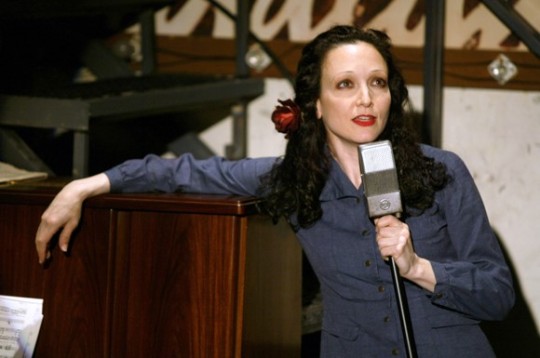
When not bound to microphones, Here Lies Jenny also involved the use of Ann Reinking’s “minimal but inventive” choreography to create striking visual images. Though perhaps not resembling the fast-paced, razzle-dazzle of Chicago, these patterns of movement are at times no less impactful. Bebe is dragged fluidly across a countertop, rolled sinuously down pairs of legs, centred in a dark tango (that one review likened as a potential metaphor for a ménage à trois), or spun backwards upside down onto Emamjomeh’s shoulder in the air – to name a few notable moments.
Not a dance show by any strict sense, all of these demands are nonetheless physically taxing. This is a matter of importance given the timing of the show.
What Bebe had long deemed a “peculiar” hip from her early twenties, begun causing notable pain when it “went from peculiar to downright bad in 2001” during Fosse on Broadway. It was recorded the “pain continued during [this] high-concept Kurt Weill revue” in 2004, such that performing this manner of movement in the show can have been no trivial feat. The next three years brought subsequent arthroscopic surgery for cartilage removal, and then total hip replacement.
That being considered, the show was able to run in the highly demanding manner it did for five months straight because of Ann Reinking’s assiduously crafted choreography.
The Zipper Theatre was the “funky downtown Manhattan space” that housed the show for that time. The timing of the production and the nature of the theatre played integral parts in the piece’s characterisation.
Roger took Bebe to see the theatre when they were devising the show, and to Bebe, it felt right. “There is this creative gesture that we are making and the gesture is completed if it’s in this place.” Not in some new, shiny theatre; but here, with a darkness and sense of history that created an evocative mood similar to the tone of the whole show “as soon as you walked into the building.” This was aided by the show beginning at 11pm each night – “absolutely an artistic choice” – given that what “happens between these five people, happens very late at night”, in a shadowy time of day filled by darkness and secrets.

Here Lies Jenny ended its run in New York in October 2004. But this did not mark the end of the piece. Bebe and her troupe took the show to San Francisco in the Spring the following year – after a seven month interim that included filming thirteen episodes of Law and Order: Trial by Jury, the aforementioned hip cartilage removal, and subsequent recovery.
The show was not deemed flawless by everyone who reviewed it. Some thought it too dark or wished for less abstraction and ambiguity. But as one article would conclude, “Faults aside, it’s hard not to recommend a show devoted to Kurt Weill,” ultimately providing a “unique and polished evening at the theatre.”
Roger Rees would reflect on the show, “Weill & Neuwirth work so well together” because Bebe’s “high standard of performance” means she is able to “delve deeply and go on forever” into material he likened to being as complex as Shakespeare.
It “demands a great deal from a performer, and she is equal to it,” Roger said. “She’s very deep in herself. There’s nothing made up about [her], which is a rare and beautiful thing. The match between performer and material is exquisite.”
This would likely mean a lot to Bebe, as the show itself meant a lot to Bebe. And still does several years later. She would cite it in 2012 as the “role she wish[ed] more people had seen”, as to her, it “was a beautiful, unusual piece of theatre”. Altogether, it was something ineffable and “bigger than the sum of its parts”.
“It’s something I've wanted to do, and I did instigate it,” she said, of putting the show together. But that’s not to say it was easy to helm matters. “For me to be in charge, makes me very uncomfortable.”
That the show got made at all then Bebe would recognise as “a testament to how deeply I love the material and how inspired it makes me.” Her trust in people like Leslie, Annie and Roger enabled the creation of such a project from the ground up that wouldn’t have otherwise existed. Thus, to borrow a phrase from Stephen Sondheim, it was the combination of both personal drive, and also the shared collaboration of four people who all “love each other very much” that ultimately ‘made a hat where there never was a hat.’
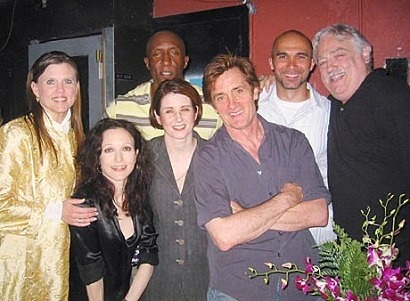
It was even further an important show to her, because it was “a very private thing.” She’d describe Jenny as a very physical and emotional role – “the most personal of anything I've done.”
It clearly holds a special place in Bebe’s own heart. Undoubtedly, it would be poignant to revisit again. As we look to the near future of theatre with shows that could feasibly be staged as events start coming back, in tandem with the publicly expressed desire of people wanting to see Bebe back on stage again, this pre-existing, modestly-sized, inventive piece would be no bad suggestion.
How about a Here Lies Jenny reprise when theatre returns?
#bebe neuwirth#here lies jenny#broadway#off broadway#theatre#theater#new york#kurt weill#composer#ann reinking#roger rees#leslie stifelman#chicago the musical#fosse#bob fosse#musical theatre#musical theatre history#theatre history#cabaret#revue#germany#lotte lenya#betty buckley#donna murphy#julie andrews#patti lupone#berlin#stephen sondheim#bernadette peters#bertold brecht
42 notes
·
View notes
Note
Thank you for your take on Louis' recent 'father performance' (cause it's undoubtedly a performance, no matter if he's the father or not). I agree with nearly all of your thoughts and it resonates deeply that I'm finally reading a take like yours. I think it is obvious that Louis wants to tell this story at this point, and it's his story to tell. The possible reasons you pointed out make the most sense to me, and the sole fact that we really got this 2021/22 plot arc doesn't make me change my mind. I still believe that he is not Freddie's father in the 'traditional' sense, mostly because Briana obviously does not receive the money she would be legally entitled to.
The only thing where I don't agree with you is that the Arcade video was not intended to be seen. Most of the time fan sightings are 'organic' I guess, meaning that Harry or Louis are just living their life and don't care about being seen or not. They might even get dressed in the morning without thinking about a 'message' to fans while they meet their accountant or buy toilet paper... Anyway the Arcade video is different to me because first we got a photo where nobody recognized Freddie, only Olli and Louis, and then a day later the video. Still people were quiet about it until anons pointed out that it was Freddie (the 'Tomlinson' shirt is neither here nor there for me). I remember reading it in real time and it felt really fishy. That and the weird Xmas-without-Eleanor-episode really sticks out for me. Of course there might be 100 perfectly reasonable explanations we'll never now. Or maybe at the end of the year some things might become clearer.
Hopefully Freddie, his family and Louis had a good time together and will continue to do so (him being too young to see the consequences is a problem for me, but I know that I don't know anything and should mind my business : )
I was late replying to this, so it's actually referring to my last post about Louis and Freddie (that's a very odd thing for me to say).
Glad that what I said resonated. I'm much more comfortable describing what happened than anything else. Why will obviously be speculation. The option that makes most sense is that he wants to intervene in the way he is talked about, because the way lots of fans (including me!) talk about him now make his life harder. But there could be other reasons. Lots of the time things look clearer in retrospect, and there's lots we'll just never know.
As for the question of the arcade video - I don't think you quite fill out your argument. Are you saying that because people you follow didn't recognise it at first and the information came from anons, therefore the only possibility is that the anons came from his team? Because I just don't agree with the logic. Just because fans in this particular circle didn't recognise Freddie straight away doesn't mean that nobody recognised Freddie. There may have been conversations that you and I weren't part of where people recognised and discussed it that were then seeded into fandom discussions we see. I don't find the way the information came out particularly meaningful or limiting to what happened.
#I think it's perfectly fine not to mind our own business#Gossip is an important human tool#and your concern is a real and obvious one#I just tend to think that this is largely like child acting#not great#but it's the family dynamic that defines the impact#and resources often make people's lives better#but I totally understand if people have different positions#It's just the people who send asks that are basically#'to think Louis is doing this is to think he's a terrible person'#that I disagree with
4 notes
·
View notes
Text
2Ha (up to 120)
Or, Hamliet’s review of the most blatantly ‘problematic’ novel she’s ever read, which has beautiful writing and themes, and an intriguing plot that she apparently wrote a Jin Guangyao AU of without realizing it last year. Whoops.
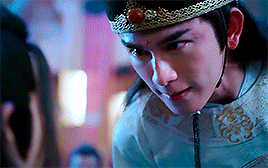
This is my fifth Chinese web novel, btw, after reading MXTX’s three novels (all of which I think are thematically rich and top-quality writing and character development-wise) and Female General and Eldest Princess (which has great main characters but shoddy writing). To a degree a lot of this might be due to the translation, but 2Ha is absolutely beautifully written in its dialogue, metaphors, and descriptions.
The story revolves around the redemption of an evil emperor--Mo Ran--who commits suicide in the very first chapter, only to wake up as his fifteen year old self with a chance to redo everything... but he actually doesn’t (at first) have all that many regrets or think he needs redemption, so there’s that. Thematically, it seems to mostly be coherent so far, but it’s hard to say with only 120/300 chapters read, and I’ll discuss the ‘mostly’ below.
The main character, Mo Ran, is basically what would happen if you combined Xue Yang with Jin Guangyao and Wei Wuxian in a blender, but then strained out the decency Jin Guangyao and Wei Wuxian in particular clung to. If Jin Guangyao and Wei Wuxian are, archtypally, akin to the Kylo Ren/Loki archetype, then Mo Ran is Darth Vader or Thanos.
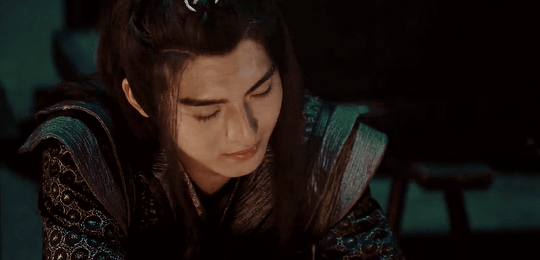
What I appreciate about this is that the novel doesn’t make Mo Ran sympathetic because it doesn’t have to: we empathize with him because he is framed honestly. There is not an attempt to manipulate sympathy, but there is an honest portrayal of complexity without whitewashing, and that is a wise choice on behalf of the author. He’s a straight up bad dude who sucks rather than a sympathetic person who clearly wants to be good but through a combination of circumstances and personal terrible choices, is not. Or so it appears at first until Mo Ran eventually realizes/remembers that he did want to be good after all, once... and it’s directly stated as much. Yet those desires have been beaten out of him, and often he’s the one who did the beating on his own soul.
Basically, the novel seems to be asking whether it is possible for even someone that cruel, that evil, to be redeemed. And the answer thus far (up till 120) seems to be that yes, he can be, but in a complex sense.
Of course, there are all manner of... elements that make it a novel I absolutely encourage caution towards before engaging. The translators are great with warnings, and I had to skim some parts. There is violence, but to be honest it’s less violent than TGCF, as someone said to me before I read and which, thus far, is a sentiment I’d agree with. My main issues is its portrayal of sexual assault, which I honestly think it’s unnecessarily graphic and eroticized at parts. That said, the story does frame it fairly responsibly (as something reprehensible, but the eroticization of some brief flashbacks contradicts this and so undermines the overall framing). Rather like Scum Villain, it also seems to be aware of the unhealthy dynamics in the ship (particularly the initial age gap) and so layers it with contradictions (he’s actually lived to 32, so he isn’t fifteen; Chu Wanning is then de-aged too, nothing happens until they’re older anyways). The layering works in multiple ways, because the novel seems to, at its core, be about exploring the very limits of love, redemption, etc., in each and every crevice of possibility.
On a personal level, the chapter where Mo Ran is awaiting judgement to get into hell and the memories of all the people he has tortured and killed start calling out his sins, and then we flashback to Chu Wanning asking Mo Ran not to forgive him, not to forgive others, but simply to forgive himself after Chu Wanning subjected himself to Mo Ran’s worst impulses, and it’s this memory, this phrase, that stops the sentence before its even written, that quiets those voices... I found it deeply meaningful, and that was perhaps my favorite chapter. It encourages empathy and enduring suffering with each other, suggesting that an honest understanding and love saves us. There’s a theological aspect to it that resonated with me as well (and, as a side note, I’m curious to read the entire thing before charting it out, but there seems to be a very clear alchemical influence as well).
However, I earlier mentioned the slight eroticization that seems to make murky the overall framing. There’s also one recent plot twist that seemed to damage the themes. I really, really didn't like how Rong Jiu's story ended even if it's ambiguous. It essentially is, as the author even directly said in her author's notes, just that Rong Jiu wasn't lucky enough to find someone who wouldn't give up on him. After Rong Jiu spent so much time pointing out the disparities in fairness to Mo Ran (why do you get a second chance while I don’t?), to have his story presumably end with "f*ck you got mine" really does not work. At least in MDZS, while Jin Guangyao isn't saved and Wei Wuxian is, Wei Wuxian empathizes and points out that it's because of a rotten society in the end, rather than just "sucks to be you." I really hope this ends up being wrong and she didn't actually continue to leave his fate up in the air as she stated she planned to do in the author's note, because if she did, that's depressingly contradictory to the story’s themes. It’s one thing if Mo Ran will later go back and save Rong Jiu, which is where I hope it’s going; it’s entirely different if this really is the ending for him, and would keep the novel from thematically approaching MXTX’s level.
So yeah. I am eager to see where the novel goes, although the translations are on hiatus (hats off to the translators for their beautiful work!) and I’m wavering on how desperate I am as to whether to try the MTA translations or not...
A theory that very well may be wrong: I suspect the mysterious black-veiled water user is actually Shi Mei, mostly because Shi Mei is likable yet missing serious flaws, unlike every other major character, which makes me suspicious. He also had that very weird line during the Lake Arc when Mo Ran was captured, and water is associated with healing, which Shi Mei is also associated with. Oh, and Water Mystery seems very interested in Mo Ran loving Shi Mei and protecting his life. So if he isn’t Shi Mei, he’s someone connected to him.
For now? 8/10, but with serious warnings for those who might seek to read it.
51 notes
·
View notes
Text
Little Women (2019)
A first for the blog: a guest post! The following is a review of Greta Gerwig’s Little Women (2019) by Carly Henderson.
---
When creating a film version of a classic novel, one often wants to justify its existence by approaching the story with a new lens that appeals to its contemporary audience and differentiates it from previous film adaptations. The temptation with this approach, however, is to take a sub-theme and make it the overarching theme, or to misinterpret a theme altogether. The resulting film, then, is either off the mark or entirely antithetical to the source material. This is often what happens in modern adaptations of classic stories (Ang Lee’s Sense and Sensibility, Joe Wright’s Pride and Prejudice and Anna Karenina, Julian Jarrold’s Brideshead Revisited, and Netflix’s Anne with an E, to name a few), and is also the case for Greta Gerwig’s Little Women.
My opinion will be unpopular, as Gerwig’s adaption of Little Women has been widely received with praise for its creativity, innovation, liveliness, direction, and attention to the novel and its fresh resonance with a modern audience. And it’s true: it��s lovely to watch, overall well-acted, has an excellent score, and, I would argue, is the most bold and creative take on the classic story by Louisa May Alcott yet. Many commenters at the film’s release said that every generation deserves its own Little Women, and this version of Little Women is one that only a modern feminism could create and deserve (the film opens and closes with a salary negotiation between Jo and her publisher, the first scene ending with her acceptance of an unjust wage from her publisher, and the last ending with her fair negotiation, making her an equal player with the man). Even so, what makes it distinctive also makes it a denial of itself. Its modern lens overlooks and destroys the heart of the story, and its bold, artistic rendering ends up being a beautiful but empty shell, lovely to behold, but easily cracked and hollowed of its substance. And this is what we get with Gerwig’s Little Women: it’s a coming of age story that focuses on women’s empowerment, equal wages, opportunity, and creative genius at the expense of the growth and maturity of its characters. Alcott’s Little Women is certainly empowerment and creativity, but it is much more than this—it is at its core a story about growth, virtue, and a certain open receptivity before life that allows one to truly be creative and fruitful.
Though I may have criticism of the film overall, the acting in it is a masterclass: Saiorse Ronan is a force to be reckoned with; Florence Pugh makes the ever controversial Amy loveable (perhaps even more lovable than Jo, which is quite the feat), and Timothee Chalamet is a good Laurie, perhaps truer to the novel’s Laurie than Christian Bale’s portrayal in the 1994 adaptation (though his Laurie for me remains superior to all other Lauries). The film is not linear. It starts in “present” adult life, as Jo is in New York and Amy in France, and shifts back to childhood in flashbacks. This has a dizzying effect and can be difficult to follow, even for those familiar with the story. The advantage of this is twofold: on the one hand, the film seeks to take the adult versions of these characters seriously, where other film adaptations tend to give more time to their childhood; on the other hand, it bends the audience to favor a Laurie/Amy pairing from the beginning. This is a victory for sure, overcoming the long-held resentment about Amy, as many continue to think that Laurie should have ended up with Jo. And there is no doubt that Gerwig is technically excellent: the cinematography is beautiful, the music is beautiful, the costuming is beautiful.
But the film gets a great deal wrong about the novel, which should matter if one thinks that a film adaptation should try and capture the animating force of its original material, even if it is impossible to illustrate every aspect. I will limit myself to three points.
First, the film gets Beth all wrong. In the novel, Beth is the heart of the story. She is warm, sweet, and gentle, the one who has a special bond with Jo and the only one who can temper and correct her. Gerwig’s Beth is an odd recluse—apparently also a concert pianist—who is abnormally childlike and random, and without the warmth that is one of the defining traits of Beth’s character. She is often called “sweet one” by her sisters, but little is done in the film to communicate her sweetness. She whines and complains when no one will join her to visit the Hummels; she speaks like a 4 year old before the horses. And, above all, the warmth between her and Jo is not felt. Jo needs Beth to be herself to temper her fire and refine it to something more true, strong, and gentle. It feels as if Gerwig must reconstruct Beth because Beth’s quiet, gentle, and demure personality is not consistent with the idea of femininity as creative self-determination that Gerwig favors. Beth can’t be herself in this film because for Gerwig Jo needs no character arc: she has nothing to learn other than to be more forceful and direct. In fact, Jo seems to be the best of womanhood, forging her creative path and destiny with no need of anyone—not her father, not Prof. Bhaer, and not even Beth, which is in striking contrast to the book.
Aunt March’s character is similarly sacrificed to Gerwig’s particular ideal of femininity. Interestingly enough, Aunt March in this film becomes the aspirational model. In contrast to the book, in Gerwig’s film, Aunt March is the sister of Mr. March. This means she is not only unmarried and rich; she also has never been married, which for Gerwig means she has freedom and means. Let’s side step the question of how an unmarried sister inherits and keeps the family wealth, and note that the real problem here is that Gerwig’s Aunt March represents the only path to freedom for the March girls: money. Are we really prepared to declare that freedom simply is access to capital? That none of the girls’ artistic endeavors mean anything unless they indeed capitalize on them? Here it seems to me particularly clear that Gerwig unknowingly submits Alcott’s work to the architecture of late-stage capitalism.
Additionally, Streep’s Aunt March is a one-dimensional character, surprisingly enough for Streep. In the novel (and in the 2017 BBC adaptation by Helen Thomas), Aunt March is a tragic figure: a widow whose only child died in her youth, and one who says stupid things, but then later realizes it and has the humility to apologize. She therefore is a character of depth—that is, in the novel, she too grows and matures, whereas Streep’s Aunt March has no arc. Streep’s Aunt March is the woman to be: nothing to learn and dependent on no one.
These first two misinterpretations are ultimately the consequence of Gerwig’s misunderstanding of the novel, or perhaps better, her imposing her own (capitalist?) framework on Alcott’s work. In Gerwig’s Little Women, feminine agency is pure self-determination, self-construction, choice, and ambition (which is agency simply in a liberal, capitalist society). This is why Jo and Amy stand out in this film, and Meg and Beth only awkwardly fit in until they ultimately fade away (figuratively and literally, respectively). Indeed, the film’s overarching framework of women as creative, ambitious, self-directing and -constructing, cannot explain the beauty, dignity, meaning, and fruitfulness of both Meg and Beth’s lives apart from choice, precisely because their lives are very hidden, normal, and for all intents and purposes, without fiery ambition. Indeed, choice is the only way to understand Meg’s character in this framework (and which Emma Watson attested to in various interviews): Meg has chosen to be a wife, and this choice gives her life’s path purpose, meaning, and reconciles it with Gerwig’s feminism. Being a wife and mother in and of itself is not what gives her life dignity and purpose—rather it is her choice to do so that does. This problem also stands out in dramatic effect in Amy’s monologue (penned for this film) of marriage as an economic institution that depersonalizes women, as well as Jo’s similar understanding of marriage. Granted, marriage is an economic institution and this aspect of it was particularly felt in this time—but it is not solely an economic institution. It is a good in and of itself, formative for the person, and, above all, the form of love itself. In promoting the almighty reign of choice, the reality of love is undermined, and, ultimately, the true dynamism and variety of femininity is undermined.
But if domestic life is worthy of art and importance, as the characters reflect on at the end of the film, it isn’t because it is something merely chosen by women. We can make poor choices after all. It is rather because there is something inherently important and meaningful about domestic life itself. But if Gerwig were to admit this, it would undermine her framework of feminine agency, freedom, and choice, equality, and thereby, the whole theme of her film. We see this in the meta ending, which, despite the popular interpretation of the novel, is not ambiguous: in Gerwig’s retelling, Jo does not marry Bhaer. Why? Because she is told that she loves him; Gerwig’s Jo would never let anyone tell her how she feels and then stake her life on that (it is interesting to note that, in the book, Jo comes to realize, on her own, that she loves Bhaer, and her family gives her the space to discover this).
And while we are on the subject, I will add one final thing that the film gets wrong: Professor Bhaer. Sure, Louisa May Alcott may have written this character with tongue in cheek to stick it to her publisher for marrying Jo off at the end of the story—i.e., instead of a young, handsome man, Jo falls for an older immigrant, who is bear-like, awkward, yet sweetly endearing—but he is still a good and important character for Jo’s arc as both a woman and a writer. In casting (the strikingly beautiful, might I say) Louis Garrell as Professor Bhaer, Gerwig plays into the cliché ending that Alcott intentionally avoided. Gerwig’s point is clear, but made without the nuance and depth that Alcott gave both the character and the ending.
Whatever the case of Alcott’s original intention, the fact is, Jo becomes a true artist when she allows herself to be affected by others: i.e., when she allows Beth’s nature to temper hers, allows herself to be guided by the wisdom of her father, and allows herself to be moved by the wisdom and love of Professor Bhaer. This isn’t to say that she isn’t creative or independent; it is to say that creativity is always the fruit of relationship. Creativity does not come out of nothing; much like virtue and fruit, it is pruned out of us, sometimes painfully, by another and by life itself. This is what Gerwig’s tale misses, and this is ultimately why it is a deeply dissatisfying adaption.
#little woman 2019#little women#greta gerwig#little women movie#saorsie ronan#timothée chamalet#florence pugh#emma watson
25 notes
·
View notes
Note
#this motif in particular slays me#my feelings about loss and reclamation of identity and autonomy and selfhood let me show you them! UH YES
It’s one of the most important things about Star Wars for me. There are other themes I find really meaningful, of course—resistance to oppression and injustice, redemption, the power of love—but Anakin’s arc especially really hits me where I live, and all those things tie into it too.
Just—we meet him when he’s a small child whose world, aside from his mother, treats him like an object, but he holds on so hard to his personhood and his identity, both in spite of that and because of that. Then he’s trained by the Jedi, which in theory should mean he’s allowed to be a person, but instead it’s kind of more of the same—no personal relationships, no feelings, no choice in self-presentation or much of anything, not to mention the constant reminder of “you may be a child, but we don’t trust you for a second.” He’s a Jedi, and maybe the chosen one, and maybe a threat, and where does that leave room to just be Anakin? The Jedi mean well, and in name he’s free, and maybe that should make it better, but instead it seems like it gets into his head in a way that outright slavery didn’t manage. (Palpatine’s grooming can’t help.) Gone is the certainty of “I’m a person, and my name is Anakin,” replaced with the kind of posturing that masks insecurity. Somewhere along the way his sense of self is damaged, gets more and more fragile, until the turning point comes and he’s willing to give it up entirely. Give up being Anakin. Give up being a person. Give up having a moral code or a community or personal connections or hope. He falls abruptly from desperation into despair and stays trapped in it for over two decades.
What saves him—or shows him how to save himself—is Luke and his love and his insistence on Anakin’s identity. Through that and his love for Luke, he reclaims himself, saves both of them at once, and dies not as a tool but a person named Anakin.
I’m not entirely sure why stories like this resonate so much with me. Maybe part of it is to do with how important a struggle for identity has been in my own life, re: trans stuff, etc. Or the time I’ve spent feeling out of control of my life and body, like I didn’t belong to myself and I’m not a person. And then there’s the struggle of despair and hope, ethics, redemption…whatever the reason, it is, as they say, my jam.
6 notes
·
View notes
Text
This got really long and I don’t want to dump more Opinions (w/ thanks to @s-cornelius and @coldwaughtersquentin for discussing stuff w/ me about this) all over someone else’s post; so here’s a few more thoughts about Julia & Quentin:
Like I pointed out here (and others said basically the same thing) the scene at the end of 4.10 between Julia and Q has a LOT more nuance than just “Julia shouldn’t tell Q to help her it’s selfish/she’s not being a good friend b/c she doesn’t know the exact right thing to say/etc” for a few reasons;
Firstly, for the sake of completeness, I already pointed out that the plot demands it. I think Julia said the wrong thing to Q in this particular situation. I think that is important to his character arc. I think her suggestion was a reasonable one given that she knows Q has responded well to quests in the past, and that he’s in a different place now and needs a different answer.
Julia is a character and every once in a while characters are gonna make poor choices to further the plot. Which honestly happens a lot on this show; a character is given a few bad choices and with the limited information they have, they choose poorly OR EVEN choose well but with disastrous consequences anyway. That... keeps the show interesting. It is storytelling. Your feeling are valid but like; if it helps? This is more about Q’s full character arc this season than it is about Julia being a shitty friend.
Secondly, the Julia & Q conversation is a direct parallel to the Margo & Lizard!El one.
Margo says: "Look, I know you're just a reptilian hallucination. But I miss you...so much. And I promise you I’m gonna get you back." (Especially after she says "The only thing I ever did right was be your best friend. That's the only thing I ever got right." )
Julia says: “Look, once I finally get this goddess shit straight...I need you.”
Julia walking over to Quentin and telling him she needs him is the same sentiment as Margo saying she’s gonna get Eliot back.
Monster!Eliot can be read as a foil for Depressed!Quentin this season; yeah, he's always depressed but this is Clearly Worse. (And depression is a bit like being possessed by brain weasels right?) Julia’s been here this whole time doing whatever she can to help him on his quest to save Eliot from the Monster. And not to mix up parallels (b/c they’re all over the place and it’s great) but just like Margo, Q’s gone through this quest to collect grains of sand stone god organs only to find at the very end that it was all for nothing.
Julia's not saying he should give up on his quest to save Eliot and help her instead, she’s saying that plan A didn’t work so it’s time to try something else; if she can figure out her goddess powers then MAYBE they can use that instead (though she tiptoes around saying that directly b/c Q is having a hard time facing it directly, and that’s fair). And yeah, it’s a long shot, a plan B, and they don’t know how it will go. A few episodes ago she didn’t sound too excited about being a goddess at all, but she is willing to do it in order to help Q. That’s a lot.
Thirdly, I think Q is a really relatable character because of his depression, but depression isn’t a one-size-fits-all thing. I think it’s a really great thing to talk about how something in a story resonates with you, or how you identify with a character, and how you feel bad because of how it’s presented in the story. Or how you feel like it was a good choice because that's something that helped you! However, making blanket statements that something in the text Is Definitely A Certain Way period end of discussion is always a dangerous statement to make. Our interpretations of stories are super meaningful, there’s so much space in stories that we can fill in with our own experiences and intuition. Inference is important! But this is also what separates text from subtext. One person’s inference will differ from another’s just purely based on different life experience, and that doesn’t mean one or the other is more correct. Subtext is open to interpretation. We are engaging in the text. It’s a good problem to have. Options are great!
But it’s always worth keeping in mind that the characters are not real people, and other people voicing their interpretations are. It’s always good to consider that a person’s interpretation is coming from a similar place as your own, and you do not have to agree! But, your interpretation of a fictional character’s welfare is NOT a good reason to tell someone they’re wrong about their own experience.
Fourthly, the entire garbagecoven (to steal @clpolk‘s word) of magicians students are grad student (or grad school dropout) nerds. They suck at managing their own mental health, much less having the tools to help each other. (THIS IS A REAL ISSUE WITH GRAD SCHOOL) Yes, they are friends, and they care about each other. Caring doesn’t mean you have the skills to help.
Quentin is not exactly sitting there explaining his problems to her (that doesn’t mean he doesn’t deserve or need help it is just LOTS HARDER to figure out what’s wrong and how to help with less information) and Julia also doesn’t have the insight of rewatching episodes of the Magicians to analyze Q’s every body language tell. Julia’s not a trained psychologist she’s a nerdy grad student and y’all. Your friends want to help you but they are not always gonna do it perfectly.
No one owes Q help to prove their friendship to him; no one needs to center him over dealing with their own shit. (How many callbacks were there in this ep comparing Aengus to Reynard? MAYBE Julia’s dealing with her own stuff TOO?) Julia is trying and yeah, she's not necessarily gonna say the right thing (see the first point) but please stop holding characters to some weird standard of perfect conscientiousness. Let them be wrong sometimes. Let them be selfish sometimes. Let them hurt each other sometimes. This is how life is! Seeing them figure out how to move forward from these mistakes is part of what makes the story so good!
Finally, the important take home message of THIS SPECIFIC EPISODE is about how holding women to unreasonable expectations is bullshit. Things like centering men and being nice and worrying about them first before yourself. But uhhhhh HOLDING WOMEN ACCOUNTABLE FOR LABOR THEY ARE NOT EQUIPPED TO PROVIDE is KINDA SHITTY.
tl;dr: Dear Magicians Fandom:
These poor nerds are doing their best,
But please give them the space to fuck up, they will learn from it, and it will be way more interesting than if they all knew the correct answers 100% of the time.
Your feelings and your interpretations are valid! Your personal experience and your pain about seeing Q like this are there because this is good storytelling. They are evoking strong, relatable feelings.
Be gentle with yourselves & with others please <3
#the magicians#all that hard glossy armor#tm4.10#spoilers#aj has opinions#wank adjacent#long post for ts#cw depression#omg this got over 1k words how#tm meta#sorta#julia wick#quentin coldwater#everything is complex and fascinating and wonderful#and that doesn't mean you are wrong or shouldn't feel bad or angry#but like#perspective is good too#....at least that's one of my coping mechanisms
3 notes
·
View notes
Text
So when I was looking at reviews of Enter 77 and getting mad because some critics weren’t giving it the praise it deserved, it got me thinking about how my standards for what makes good tv are just really different from those of a lot of real critics. The real critics are way better than I am at analyzing an episode, seeing if it makes sense, seeing how it fits into the show, seeing whether characters are acting out of character, etc., but in addition to all that, I feel like I’m much more willing to love an episode based on its own merits (as opposed to how it fits into the context of the show) and based on how it allows the characters to shine (as opposed to how it moves the plot forward). Not that I don’t think an ideal episode would play an important role in the show as a whole, but I think my standards for what constitutes a significant episode are just...so different that a lot of real critics’ perspectives just don’t make sense to me.
Like, to take Enter 77 as an example, it was the flashbacks in particular that were mainly being criticized, but the flashbacks are precisely what made the episode so good to me. A lot of people seem to think that the flashbacks didn’t add anything either to Sayid’s character or to the present-day part of the plot, but I don’t agree on either point. To start with Sayid’s character: yeah, we already know that he was a torturer and that he has a lot of angst about it. It’s true that we’ve already seen him be confronted by one of his victims (Sawyer) and repent to them. But while the Amira/Sawyer parallel is interesting, there are so many differences (Amira forgives Sayid, Sawyer doesn’t; there’s no indication that Sayid thought he was doing the right thing by hurting Amira whereas with Sawyer he was trying to save Shannon; the Amira encounter simply features a younger Sayid who presumably has never been at the mercy of one of his victims before, etc.) it’s impossible for me to see Enter 77 as a retread of the relevant scenes in Confidence Man and All the Best Cowboys Have Daddy Issues. As for how the episode fits into the main plot, it’s enough for me that Sayid has to choose whether to continue the cycle of mercy with regards to Mikhail. A huge, absolutely fundamental part of the show is that being on the island forces the characters to revisit key moments in their lives and confront the lessons they learned, and that’s exactly what we see Sayid do. Another major element of the show is its themes of sin, forgiveness, and what morality really is. We see these themes in the whole thing from season one about whether they’re being punished (I feel like it was Claire and Sun who had this conversation but I’m not sure), in the Others’ insistence that they’re the “good guys,” in the presence of the concept of dharma, in Eko’s final speech, perhaps in Mikhail’s claim in the following episode that Kate, Sayid, and Locke are “flawed” (I can’t say for certain because I don’t yet know what he meant), and so on. Amira is important because she simply provides a philosophy we haven’t seen before. But more fundamentally, I just really, really liked seeing such a fantastic character as Sayid in such an emotional and captivating story! It’s as simple as that! I guess what we’re really disagreeing on is whether it’s inherently worth it to see Sayid in a new situation, to give Naveen Andrews a new challenge as an actor, and to put Sayid’s character arc and its themes (and the themes of the show) in new words. I think it’s obvious which side I come down on.
P.S. I’m not touching on the few comments I saw that were like “this show sucks so obviously this episode sucks” because obviously I disagree with those people on such a fundamental level there’s really no point in arguing.
P.P.S. Yeah, this episode was clearly based on Death and the Maiden. What of it?
P.P.P.S. It just occurred to me that these flashbacks add resonance to the Sayid vs. Sawyer plotline of season 1. Not that this resonance is necessary to make the s1 plot work, but it does make it even better and more meaningful in my opinion. Sayid’s guilt over having hurt Sawyer and his line “what I did today, what I almost did, I swore to do never again” make perfect sense on their own, but I find that there’s an additional “ohhhh!” factor now that we’ve learned that Sayid had already been confronted by one of his victims once and made to acknowledge his remorse.
P.P.P.P.S. I encountered one person who thinks that Sayid’s confession was false and that Amira was wrong. Hmm. No.
P.P.P.P.P.S. This post is really just a long-winded way of saying that I really love Sayid Jarrah.
#x#Lost#Lost show#Sayid Jarrah#Enter 77#Anna watches tv#Anna watches Lost#I have many thoughts#I could go on and on about this episode! I have so many more thoughts! but this is super long so I'll stop#analysis
4 notes
·
View notes
Note
I think the real reason people fight so hard against the idea of Jaune saving Cinder is because they're deathly afraid of Jaune being given a big role. They really cant stand the idea that he might do something or might be important. I already see people talking about how they think RT can and should abandon him on the island in V9(comments on youtube). They would rather he quietly exit the story than do anything meaningful.
As you say 'real reason' I'm going to quibble: I don't think that's the real reason. That's one reason.
I don't think I'd quite frame it as Jaune saving Cinder but Jaune helping her. Sometimes people get the wrong idea with the former.
I'm also going to assume this is once again on the topic of the recent person who made look for Peep Show memes, in which case my answer takes a very specific bent, in that a) assuming them to be a good faith reasonable actor is a mistake, b) in this very specific instance I don't think it's about Jaune having something to do in the story (generally a yes from me) and c) I am a bit exhausted of the topic, so please forgive me if I repeat myself here at times, and d) you can't really divorce Cinder's redemption arc altogether from the issue.
There are several generally controversial issues at play here: redemption arcs, and the issues with those therein; Cinder's character in general (selfish bitch who needs to die); the overall thematic thrust of R/WBY (I don't even know where to begin); and finally, if you go along with the idea of a redemption arc, Cinder not being a useless character, understanding the basic themes, then you encounter the Jaune problem.
I just want to note that there are other people who aren't me who have written about Cinder and the question of a redemption arc and he's usually not included, or he's accessory to Ruby and/or the rest of team JNR. I recognise a lot of names who are into the idea of Cinder's redemption and aren't receptive and/or interested in the idea of Knightfall or don't like the idea of romance intertwined with a redemption arc. So I actually don't know if people taking issue with me for Knightfall (as in, that troll) are doing so because they don't like the idea of Cinder's redemption and Jaune actively involved or because they want Jaune paired up with someone else since he's the team bicycle. Therefore, in the latter case, Cinder's apparent evilness is kind of cursory, and whatever needed refutation is employed (too evil/mean/horrible/bad for children/toxic/killed Han Solo etc.). Or, of course, maybe someone just hates both characters. Lol
I do agree that there's a persistent issue certain constituents have with Jaune carrying a purpose in the story. I have written a lot about that under my Jaune Arc tag and my Cindemption tag. I really don't know any way his character makes sense unless this is the thing he's meant for. If people think that he's meant to kill Cinder, then there was literally no point to any of his character.
Something I really want to stress is that I am very cognisant of R/WBY being an ensemble cast show, and that means a) I know this isn't the Jaune and Cinder show but also b) if we're looking at all the characters and what they need to be doing in the story, tying up Jaune and Cinder's character arcs is a really neat way to give him something important to do which is thematically resonant. He's not going to have a dramatic final confrontation with Salem, because he's already going to have that with Cinder.
I prefer to look at things from an intertwined structural/thematic perspective. That's the type of thing I'm always fascinated by and it's why I really enjoy Jungian or monomythic storytelling, because you get a marriage of those elements (and a lot of character-driven storytelling). So my analysis is going to be rooted in the emotional (I think a redemption arc and romance is very moving) I also think the redemption arc/romance solves a lot structurally and thematically (Reverse Ozlem in particular).
So there's absolutely no way I could see Jaune staying in the Special World. (I know what the name is but I don't really want to tag this for spoilers). It's the katabasis point of the monomyth, it's where you go down to receive forbidden knowledge and then come back with it. If anything I have sort of contended the fact he's there means something special will happen, whether at worst it means we're dragged back into the Pyrrha storyline (I doubt this, for a post I'm going to make later) or because of something else might happen. You can see me discuss that more under my V9 speculation tag. Of course we never know where it's really going, and I can't control if they subvert it, but people who think he's going to say down there are just being vindictive and please don't take YouTube comments seriously. I do like complaining about them, but they aren't to be worried about. (It's also important to remember that whiny people online create whiny spaces and are very loud. Sometimes YouTube can be good for a feeling of the General Audience and sometimes not).
Sort of what I was working towards with the Cinder redemption arc married to Jaune is that I don't... know there are other blogs that write about her redemption arc in an explicitly romantic context lol. So I don't know where people are coming from or why they are taking issue with me in particular, it's why I kind of assume someone taking issue with Cindemption isn't only doing so for Jaune reasons - particularly because I've already seen these problems with the question of redemption arcs played out. Over. And. Over. And. Over. Especially the idea of romance at all being involved lol.
Jaune is one part of the problem. He also has those issues of not being liked/not making sense because they think he's got to be some kill death machine or he's getting in the way of the Real Story just like Cinder/Vomit Boy/there's no way a thematically appropriate romance could happen it just needs to be with Best Girl. I swear to God if anybody says Best Girl near me I'm going to break something. Instant block if anybody tries it.
I've also gone on record many times saying that given both Jaune and Cinder come from nothing and share such similar fandom reception they actually make a lot of sense together but what do I know lol.
Thanks for your ask anon. I think you're underestimating the issue of Cinder's redemption arc and why it's, er, a complicated issue and potentially offputting, but I otherwise agree involving Jaune makes it even moreso. As I said, I know there are others who think her redemption arc will only involve platonic relationships or characters who are not Jaune/whom Jaune is accessory to, but I don't think the honest troll is coming from that angle at all.
Everybody has manifold motivations and we can only generalise based on trends and what we assume to be each other's backgrounds. I mean, Jaune helping Cinder to some people may not even necessarily engender romance - I actually just realised, whilst writing this, that I assumed you agree with me that it does, but it may be that you don't. So you see, it's somewhat hard to parse sometimes. I'm going a bit cross-eyed, but let me summarise the issues: Cinder; Cinder's redemption arc; themes are for primary school book reports; Jaune.
Sometimes the issue is as simple as romance is for dumb dumb stupid girls who know nothing

and why would romance serve a thematic purpose etc. I have no idea what Blake/Yang is doing or Ozlem is doing etc. etc. why would Jaune or Cinder get to have anything etc. etc. etc.
#seraphina's asks#user: anonymouse#knightfall#I hope that makes sense lol#not my best answer#I'm going cross-eyed
0 notes
Text
Well Made Futility: Infinity War Thoughts
I saw Infinity War for a second time and have some thoughts. SPOILERish thoughts, so, y’know, a cut here for the sake of those who care about such things.
I mean, I actually think this movie is better if you know what you’re in for going in, but I’m weird so what do I know.
So like... Infinity War is fucking difficult to evaluate. It’s a movie that does something completely unprecedented in film - while we all enjoyed joking about it, no single movie crossover has attempted to weave this many VERY different stories, characters, and (especially) tones into one coherent narrative before. It is a crossover unlike any other in film. And it’s mostly successful!
but
I know we all like to dunk on Marvel’s films because they’re popular and make a lot of money, and all of us have an inner hipster who hates things that are successful regardless of their actual quality or content, because fuck that man we’re not normies we only like things BEFORE they’re cool. But as a person who loves “genre” fiction - i.e. Sci-Fi, Fantasy, Horror, anything that isn’t set in standard reality - the Marvel movies have been kind of revolutionary. Genre films had gotten so LIMITED before Iron Man, and it was stupidly limited at that. We could accept that a billionaire fury who punches criminals could walk into a police department without making everyone burst into laughter, but we couldn’t accept that a strange chemical bath would permanently bleach a clown-turned-criminal’s skin. We could accept a guy getting powers from a spider OR a guy being really good at science but not both. We could accept a guy growing claws out of his hands, but god help you if that man also wears something other than black skintight leather. Everything had to be “grounded” and “real”, and I put quotations marks around those words because what they REALLY meant in the context of Hollywood was “boring.”
but
And then Marvel slowly chipped away at that. Not at first - Iron Man and The Hulk were about as restrained as the superhero movies that preceded them, but slowly the movies conditioned us to accept weird shit. Thor brought in Norse mythology and a certain kind of magic, although they dressed it up as “advanced science”, because we were in a transition and that was a concession they could make. Captain America took us out of modern day - a risky idea, period piece action movies are never a sure thing - and also introduced the idea of a serum that can turn you into either the ULTIMATE BEEFCAKE or a red skinned skeleton man depending on your moral compass, which is PRETTY FUCKING WEIRD when you think about it.
but
Then The Avengers happened. Before that movie came out, every conventional Hollywood line of thinking told us it would fail. Movies with multiple heroes don’t succeed. That’s why Batman and Robin sucked, right - too many heroes? And Batman and Robin, why, that’s the worst film ever! Spiderman 3 had too many villains! You can’t have more than two super powered guys in a movie - that’s just movie law! Having more than two super power guys is box office poison.
but
But The Avengers wasn’t. Maybe most of you don’t remember it because we’ve had 10 years of these Marvel movies and their success seems like an inescapable fact now, but The Avengers defied expectations by being both good AND a box office success - a ridiculously lucrative one at that! The Avengers took a huge fucking risk and it paid off.
but
Then it happened again. People assumed The Avengers was as weird as you could go. Critics were CERTAIN these movies would peter out eventually, that they couldn’t keep doing the impossible. One of these risks had to doom them. And a lot of critics looked at one movie on the post The Avengers slate - Guardians of the Galaxy - and said, “That’s the one - that’s gonna be the turd. A movie about a talking raccoon and a tree monster - two RIDICULOUS character concepts that sound more like jokes than something a studio would actually put in their action movie - along with some d-listers no one but hardcore nerds care about, all directed by a guy best known for gore-filled low budget b movies? That’s going to kill Marvel. There is no way that film can be good, much less a financial success.”
but
Guardians of the Galaxy was not just good, but it’s the best series within the franchise. Yeah, fuckin’ fight me on it nerds. (no actually don’t I’m voicing a subjective opinion in this paragraph I don’t actually give a shit about ranking movies like this)
but
Even when their movies weren’t game changers, they were still solid and fun. Whether or not they’re your cup of tea, Marvel’s superhero movies are never worse than “good.” Some of them are “great.” Some, like The Avengers, Guardians of the Galaxy, and Black Panther, are arguably transformatively great. At the very least, these films taken as a collective whole have changed the way we approach Genre Films. They have redefined what is possible - they reminded Hollywood that suspension of disbelief is a malleable thing, even if some studios haven’t quite grasped the concept yet.
but
Which brings me back to Infinity War. Like The Avengers before it, Infinity War brings different characters from many different stories with many different tones and styles and, to an extent, genres/subgenres, and blends them into a coherent and emotionally resonate whole. It requires you to have seen at least the majority of the previous DECADES worth of movies to work, but that’s not a flaw - no more than, say, the twentieth chapter of a novel requiring you to read the previous 19 at any rate. Infinity War needs those previous films to function, and to its credit, it not only uses what they built, but does so in genuinely surprising ways. You didn’t think you needed a Rocket Raccoon/Thor team up in your life, but this movie proves you did. You also didn’t think you’d see Rocket Raccoon genuinely reach out to Thor (who, to him, is a relative stranger) and try to help him through his grief, but it happens, and it’s a legitimately interesting moment that movies both characters forward in their respective arcs. This movie is more than just taking a bunch of toys out of a toybox and smashing them together (though yes, there are parts of it that are very much that - these are action adventure movies, after all). Characters develop and bounce off each other in glorious and meaningful ways. There is a weight to everything beyond the obvious, mercenary Hollywood mandate to make as much money as possible by getting fans of all these different franchises into one theater.
but
The movie even tries to rectifies some of the franchise’s most notable flaws, in particular their lack of decent villains. You could count the number of actually compelling and interesting villains from the previous 18 films on one hand. Thanos, the big bad of this film, finally gets us to the other palm. His motives are understandable but NOT justified - that is to say, you can understand why a person may believe what he believes, but at the end of the film you know for a fact he’s wrong. Thanos is a bad guy whose evil plan will destroy countless lives, but he manages not to be the cartoonish caricature of a villain whose over the top “destroy the world” motivation makes no sense. It’s nuanced, is my point. I don’t think he’s the best Marvel has offered us - he wouldn’t crack my top three just yet - but he’s miles above most of the competition.
BUT
So here’s the crux of my review. When I got to the ending of the movie - an ending that, admittedly, I spoiled for myself ahead of time, because I do that for most movies ever since I got majorly burned by Jurassic Park III when I was a teen - I couldn’t stop thinking about it, because it’s... it’s a paradox. Not just the ending, either, but the whole movie. This is a film that both does and doesn’t work. It is both an amazing feat and... and fundamentally broken.
And it all has to do with those 18 films before it.
Ok, so: if taken as its own story, that is to say, as just it’s own thing, not the part of a greater whole... then the ending of Infinity War is exactly the ending this story needed. This is Thanos’s story more than anyone else’s, when you get right down to it, and from the perspective that this movie is meant to tell his story and his story alone, the ending is the only one that would fit. Thanos gets everything he wants, at the cost of everything that mattered to him. His crazed vision finally comes true, and the audience feels the full weight of how horrible that is. That ending - that maddening, confounding ending, where almost every hero we’ve come to love over 18 goddamn films is killed with the snap of his fingers - shows us exactly why we can’t let monsters like Thanos come to power, and how even the monsters like Thanos himself are destroyed by following those mad dreams through (a point reinforced by the cameo of a long forgotten past villain, Red Skull).
However, as I said before, you really CAN’T take this movie on its own. Structurally it DEPENDS on you seeing those previous films. You have to have seen them just for this movie to make sense, and to be emotionally affected by it you must also have cared about those movies and their characters. This movie is a sum of those parts.
And as a followup to those 18 films - as a part of their greater whole - it fails. So many characters we followed and love - Black Panther, Spider-Man, every fucking guardian of the galaxy except Rocket and maybe Nebula if we count her, just to name a few - is killed off in a literal instant. With the exception of Loki, each of these deaths kind of renders their preceding journey pointless. Peter Parker was just starting his journey in his preceding film - so was Black Panther, so was Dr. Strange, so were many of the others. Imagine if Hamlet was killed in act 1 of his play - everything about him would be unresolved, and all of his supporting cast would have no anchor to the plot since the conflict they’re involved in is removed with Hamlet’s death. You’d have to start over. Other characters are farther along, but with rare exception, none of them had what could be called a satisfactory end. If the deaths in this movie actually hold true, then most of the preceding 18 movies have been broken. They are wastes of time.
Of course, a savvy person would note that literally every character killed in this movie has been cast in the next Avengers film, due out next year. Spider-Man and the Guardians have announced movies with release dates after that one, too. Black Panther’s sequel has been announced although the release date has not. These deaths are highly unlikely to stick.
BUT if that’s the case, well... then this movie’s broken again, because now that ending has no weight. Now that ending is pointless - in fact, this whole movie is, because it’s all just going to be undone by the next. Either this film was a narrative waste of time, or the preceding 18 were. There’s no other option.
...but...
There is, I suppose, a possibility. A faint one, admittedly - I have no idea if they can achieve it. There’s a possibility the fourth Avengers film could find a way to make this movie’s weight hold while still putting all those dead characters’ stories back on track. Infinity War was conceived as a two part film story, after all, even if they dropped the “Part 1″ label come release. No matter how much this film wants you to think otherwise, it is just part of whole - and maybe, just maybe, the second one will make the first work WITHIN that whole.
I don’t see how it can, but then, I didn’t see how they could make me care about fuckin’ Rocket Raccoon. And Guardians of the Galaxy is, as I said, the best one.
If I were a betting man, I’d bet on this movie ultimately being a narrative cul de sac - a very well made, but ultimately pointless entry that is invalidated by what comes after it. If that ends up being the case, then that’s kind of sad - but there’s a chance they may make it work after all, and if I’ve learned anything, it’s not to bet against Marvel.
19 notes
·
View notes
Link
STARWARS.COM: “The Gathering,” in which young Jedi have to find their lightsaber crystals, and the depiction of lightsaber construction.
DAVE FILONI: “The Gathering” really, I think, was George’s effort to clarify the way he felt Jedi got their lightsabers, and he felt that it was something that happened when they were very young. He definitely threw us all a curve when told us that the crystals don’t have a color until the Jedi actually have them. And then I thought that that was really interesting. That’s one of those things that only comes from George, when you’re going to the mind of the Star Wars encyclopedia. It makes sense, because if an average person goes in that cave, there’s tons of ice and tons of crystals and you can’t tell the difference between them. It’s almost like a defense mechanism. But when a Jedi is in tune with one, the one that calls to them, they can find it. And then when they have it, it basically will make a blade when it’s bent a certain color. I thought that was one of the nice revelations there.
I also liked that it was a very spiritual thing. The threat in that cave is basically only what you take with you, which is exactly what Yoda tells Luke. It makes sense for these very young children.
It’s come up since then. I’ve been asked, “So what do Jedi do if they lose their lightsaber later?” Well, A) they’re not supposed to lose their lightsaber, but B) there are enough lightsabers that have gone from fallen Jedi over the many, many, many years, that they actually have lightsaber crystals at the Temple. So they don’t have to actually go all the way back out to Illum to get one, and because it’s a fallen Jedi they can actually use that crystal and it will work for them.
The whole attunement and everything is just a special moment for them as a child to get in tune with the Force. It’s not so much being in tune with your lightsaber. That’s a big thing that we all make a mistake on, is that we get very attached to our lightsabers. [Laughs] “Oh my gosh, I have to have one.” But remember, they’re Jedi. A lightsaber is just a thing. It’s not Excalibur, it’s not like an ultimately super-special thing. It is to us, because we make it a symbol when we watch the movie and Luke is given his father’s lightsaber. That lightsaber is a little more meaningful because it was his father’s. But you notice when Luke loses it…
STARWARS.COM: He doesn’t freak out.
DAVE FILONI: He doesn’t go on some journey down in Cloud City to go get his lightsaber, and he doesn’t even super-lament the fact that he lost his lightsaber. I mean, we were probably more upset as kids that he lost his lightsaber. [Laughs] All those things kind of came up in our telling of the tale of lightsabers, and George had a lot of thoughts about that. It all comes back to selfish versus selflessness. That’s always a key thing when dealing with Jedi and Sith, and I think that’s expressed in “The Gathering.” (x)
STARWARS.COM: That whole scene, where Maul is cradling Savage as he dies, and later when he’s begging for his life, he reminded me a lot of the Son from the Mortis arc.
DAVE FILONI: Oh, sure.
STARWARS.COM: Was that intentional? Or is it just that the Son represents the dark side and so there is going to be a correlation there?
DAVE FILONI: I think it’s all of the above. I think part of it is that Sam [Witwer] plays both of them, so there’s a natural resonance between the two characters. But part of the reason why, when it came down to it, that I wanted Sam to play Maul was because he had played the Son. And I wanted this concept, which is a very far-out concept, that there were echoes of everything that happened on Mortis happening throughout the show. And that Maul is an echo of the Son and some of the evil the Son was talking about which echoes in our galaxy. There were certain things that Sam and I did vocally that we wanted to be specifically like the Son. When we first find Maul, you can even hear Maul muttering some of the same dialogue that the Son actually says on Mortis. So there’s definitely a connection between those two characters, because they’re both connected to the dark side of the Force.
[…]
STARWARS.COM: When Maul came back, I thought, “This is foreshadowing for what’s going to happen to Anakin.” Right down to his mechanical legs. He keeps himself alive through hate and becomes this twisted thing. And I thought it was successful just on those grounds.
DAVE FILONI: Thanks. It’s a thing about Sith. They’re afraid to die. Fear attracts the fearful. Because for them it’s the end; if they die, it’s all over. There is nothing for them beyond their existence, because their power is all wrapped up in their life, in their existence. Once that’s gone, they believe they lose all their power and everything goes away. They don’t live on after death like Jedi learn to, eventually. Jedi believe you become part of the cosmic Force and your existence goes into that, but you don’t maintain your consciousness. That’s something that Qui-Gon learns, and that idea is developed and Yoda eventually learns it by communing with Qui-Gon, and then he passes it on. But that’s the big difference. There’s such a big fear of death because they try to hold onto life. And I think that’s why they’re willing to basically mutilate themselves and live these cybernetic half-human lives. Grievous is an echoing of that. They’re taken over by the machine and they’re subtracted from nature. And if having midi-chlorians in your blood is part of what makes you [feel] the Force, these are beings that are suddenly subtracted from that.
STARWARS.COM: I wanted to talk about Ahsoka. My feeling is, if it wasn’t clear before then it definitely is after the four-part finale, that she’s the main character of The Clone Wars. It’s really about her journey and her growth, and her leaving the Jedi Order symbolizes a lot about what the war has done to the Jedi. Was where she ends up at the end of Season Five always the intended path for her?
DAVE FILONI: [...] Her ultimate point is that the Jedi are aware of Anakin’s shortcomings. They’re not naive to it. Yoda, in particular, talks to Obi-Wan and they give him this Padawan, saying, “Knowing Anakin as we do, he will not want this girl to be around. He’ll resist it. But if and when she wins him over, he will bond with her like everything else he does. Like R2-D2, like Obi-Wan, like Padmé. But this girl will be different, because he’ll basically raise her. She’ll be trained by him, and he will see in the long run that she overcomes her fears and she becomes a Jedi, and she does not need him. But she respects him and they become equals, and Anakin needs to learn this so he can let go.” And Yoda knows this is critical for Anakin. If you look at her episodes, as early as when she rescues Plo Koon from the Malevolence, and she’s learning from Anakin how to disobey orders but still be creative within following orders. And then she has a big failing when she goes to Ryloth and all these pilots die, in a way, because of her error, and she has to overcome her fear that she’s going to let them down again. She’s learning. Then we see a big, critical episode arc where Anakin and Luminara kind of compare Padawans, Barriss and Ahsoka. And that arc, I think, really set an interesting tone for ourselves and for the fans. We were trying to illustrate the difference between the way Anakin is raising his Padawan, and how much he cares about her, and the way Luminara raises her Padawan. Not that Luminara is indifferent, but that Luminara is detached. It’s not that she doesn’t care, but she’s not attached to her emotionally.
And at the end of the day, one of the questions that I guess I pose is, is that really a good thing? Is Anakin’s way of being so compassionate wrong? Because on a certain level, you have to accept that the Jedi lose the Clone War. So there is something that they’re doing that’s wrong. There’s something they’re doing that doesn’t work and that the dark side is exploiting. If anything, it’s Luke’s overwhelming compassion and love for his father that in the end overthrows the Emperor because it’s something that he doesn’t understand. So as far back as Anakin, there is a seed of an idea of love and compassion, which admittedly in Attack of the Clones, the Jedi say they’re lacking because they’ve become arrogant and very sure of themselves. As Ahsoka gets older, her first big challenge comes when she’s abducted by Trandoshans and put an island [to be hunted for sport]. Anakin is put in a position where he can’t help her, and he obsesses over trying to find her, and there’s nothing he can do. But she survives anyway, and at the end of that she says, “I was only able to do this because of your teachings. Because the other Padawans I was with, boy, they were completely messed up. They were cracking.” So again we see this comparison of where Ahsoka is at because of Anakin, and where these other Padawans, which represent the other Jedi, are at. When you get to the finale [of that arc], once you see her pretty much taking on the role of a mentor and teaching these younglings to survive, you see Ahsoka doing more things on her own and you notice Anakin’s not around.
Then at the beginning of the last arc [of Season Five], she basically saves Anakin the way Anakin would’ve always saved her in the past. And Anakin’s unconscious, he’s like, “What happened?” She says, “I saved your life, don’t worry about it.” It’s fun and he laughs about it then, and he’s not embarrassed by it. They’re a team. So we get them to that moment and then we put a ton of pressure on it. And through the whole trial, Anakin is the only one that stays 100 percent in her court. I think Plo Koon stays 75-80 percent of the way in her court because he says, “I don’t believe she could’ve fallen so low.” In Obi-Wan we really see the Jedi because he is compromised. Obi-Wan doesn’t believe Ahsoka is guilty of these crimes, but he has a very hard time arguing politically that the Jedi Council shouldn’t do what they do to her. He trusts in the Force, which is what they love to say when they don’t know what they’re doing, and they expel her. He can’t argue the logic. He doesn’t like Tarkin’s logic [but he can’t argue] that they can’t try her within the Jedi because the public, which we show in this episode arc, who are losing faith in the Jedi, would cry foul ball. “How can you put her on trial? Of course you’ll find her innocent. She’s a Jedi and you’re a Jedi.” So they expose themselves, and we see how they’re exposed. All of these things that are wrapped up in Ahsoka’s story, which ultimately make her realize what the audience realizes. “I love the Jedi Order. They’re very important to me, I’ve always respected them. But there’s something wrong here, and I need to walk away from it to assess it.” It all feeds into Revenge of the Sith when the chancellor says, “The Jedi have just made an attempt on my life.” When you see these four episodes, I think you have a better understanding of how he gets away with all of that, because you see how compromised the Jedi Council is. And these episodes aren’t just meant to get Ahsoka on her way, but they’re meant to explain in more detail the scene [in Revenge of the Sith] where Yoda, Mace, and Ki-Adi-Mundi are discussing arresting the chancellor, and what a gamble that’s going to be for them. Because you see that to the average Coruscant citizen who’s not impressed with this war or the Jedi anymore, they’ll see it as treason. It’s probably the arc that connects to the movies the most and has the most impact. I think that’s why it works on so many levels for me and is one of my favorite arcs, because it’s such a companion piece to the films. (x)
#interview#dave filoni#behind the scenes#clone wars s05e06#george lucas#lightsabers#the gathering#jedi order#kyber crystals#ilum#crystal caves#yoda#luke skywalker#maul#the son#mortis#parallels#the force#dark side of the force#sith#fear#anakin skywalker#cosmic force#qui gon jinn#midichlorians#episode v#clone wars#clone wars s05e16#clone wars s03e15#clone wars s03e16
7 notes
·
View notes